pGraphicalFunction Class Reference
#include <pGraphicalFunction.h>
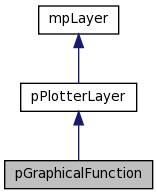
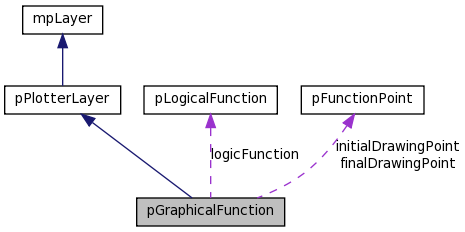
Public Member Functions | |
| pGraphicalFunction (wxString name=wxEmptyString, int flags=0x00) | |
| ~pGraphicalFunction () | |
| virtual int | getXTraslation () |
| virtual int | getmType () |
| virtual int | vGetType () |
| virtual void | getOffsets (int &offsetX, int &offSetY) |
| virtual void | getFactorZoom (float &fz) |
| virtual void | getFromWindowV (bool &fw) |
| virtual void | getIfActual (bool &actual) |
| virtual void | getMax (int &maxX, int &maxY) |
| virtual void | getMaxShowed (int &maxX, int &maxY) |
| virtual void | getMinShowed (int &minX, int &minY) |
| virtual void | getScreens (int &scrX, int &scrY) |
| virtual void | setScreens (int scrX, int scrY) |
| virtual void | getScales (double &scaleX, double &scaleY) |
| virtual void | getDrawing (bool &draw) |
| virtual void | ifShowPoints (bool &show) |
| virtual void | Rewind () |
| virtual bool | GetNextXY (double &x, double &y) |
| virtual void | GetPoints (wxList &points) |
| virtual void | getMousePoint (int &x, int &y) |
| virtual void | getSize (int &size) |
| virtual void | getDirection (bool &dir) |
| int | validPointOnFunction (wxPoint realPoint) |
| int | getIndexOf (wxPoint realpoint) |
| wxNode * | GetPointAt (int movingPointIndex) |
| bool | AddNewPoint (int x, int y) |
| bool | AddPoint (int aX, int aY, bool order=true) |
| bool | DeletePoint (int aX, int aY) |
| bool | changePoint (wxPoint newCoords, int movingIndexPoint) |
| double * | getX_RealValues () |
| double * | getY_RealValues () |
| bool | orderPoints () |
| bool | deletePointAt (int index) |
| int | getSizePoints () |
| void | setScales () |
| bool | isInFunction (int x, int y) |
| wxNode * | getBefore (pFunctionPoint *point) |
| bool | isInLine (pFunctionPoint *before, pFunctionPoint *next, pFunctionPoint *point) |
| double | interpolateY (double m, int x1, int y1, int x) |
| void | setUp () |
| void | clearSplineVectors () |
| void | initializeSplines () |
| void | addSplinesPoints () |
| void | initializeSplineVectors () |
| void | GetSplinePoint (double t, double &x, double &y) |
| virtual std::vector< double > | getXSpline () |
| virtual std::vector< double > | getYSpline () |
| virtual int | getOffsetPixelsXv () |
| virtual int | getOffsetPixelsYv () |
| void | save (wxString fileName) |
| void | load (wxString fileName) |
| void | SetShowPoints (bool showPoints) |
| bool | getShowPoints () |
| void | setScreenX (int scrX) |
| int | getScreenX () |
| void | setScreenY (int scrY) |
| int | getScreenY () |
| void | setStartX (double aStartX) |
| double | getStartX () |
| void | setStartY (double aStartY) |
| double | getStartY () |
| void | setEndX (double aEndX) |
| double | getEndX () |
| void | setEndY (double aEndY) |
| double | getEndY () |
| void | setScaleX (double aScaleX) |
| double | getScaleX () |
| void | setScaleY (double aScaleY) |
| double | getScaleY () |
| void | setMinX (double aMinX) |
| double | getMinX () |
| void | setMinY (double aMinY) |
| double | getMinY () |
| void | setMaxX (double aMaxX) |
| double | getMaxX () |
| void | setMaxY (double aMaxY) |
| double | getMaxY () |
| void | setOffsetX (double aOffsetX) |
| double | getOffsetX () |
| void | setOffsetY (double aOffsetY) |
| double | getOffsetY () |
| void | setType (int aType) |
| int | getType () |
| int | getValidPointRange () |
| void | setValidPointRange (int theRange) |
| void | SetDrawing (bool d) |
| bool | GetDrawing () |
| void | SetMousePoint (wxPoint p) |
| wxPoint | getMousePoint () |
| void | setActual (bool act) |
| bool | getActual () |
| void | setScaleWay (int typeS) |
| int | getScaleWay () |
| void | setFromWindow (bool w) |
| bool | getFromWindow () |
| void | setFactorZoom (float factor) |
| void | setEditable (bool edit) |
| bool | getEditable () |
| bool | getZoomB () |
| void | setZoomIn (bool z) |
| void | setInitialDrawPoint (pFunctionPoint *initialPoint) |
| pFunctionPoint * | getInitialDrawPoint () |
| void | setFinalDrawPoint (pFunctionPoint *finalPoint) |
| pFunctionPoint * | getFinallDrawPoint () |
| void | zooming (int clickedX, int clickedY, int width) |
| void | setOffsets (int offx, int offy) |
| void | setMinShowed () |
| int | getMinXShowed () |
| int | getMinYShowed () |
| int | getMaxXShowed () |
| int | getMaxYShowed () |
| void | setMinShowedX (int msx) |
| void | setMinShowedY (int msy) |
| void | setMaxShowedX (int msx) |
| void | setMaxShowedY (int msy) |
| int | getOffsetPixelsX () |
| int | getOffsetPixelsY () |
| void | setOffsetPixelX (int offX) |
| void | setOffsetPixelY (int offY) |
| void | setColorPoints (std::vector< pColorPoint * > &colorVector) |
| void | getColorPoints (std::vector< pColorPoint * > &colorVector) |
| void | setmType (int mt) |
| void | setXTraslation (int xT) |
| bool | initializePolygon (wxPoint *points, double x1, double y1, double x2, double y2) |
| void | draw (wxDC &dc, mpWindow &w, double x1, double y1, double x2, double y2) |
| void | drawSplineCurve (wxDC &dc, mpWindow &w) |
| void | drawLineToMousePoint (wxDC &dc, mpWindow &w) |
| void | drawFunction (wxDC &dc, mpWindow &w) |
| void | drawPoints (wxDC &dc, mpWindow &w) |
| virtual void | Plot (wxDC &dc, mpWindow &w) |
| virtual bool | HasBBox () |
| virtual double | GetMinX () |
| virtual double | GetMaxX () |
| virtual double | GetMinY () |
| virtual double | GetMaxY () |
| wxString | GetName () const |
| const wxFont & | GetFont () const |
| const wxPen & | GetPen () const |
| void | SetName (wxString name) |
| void | SetFont (wxFont &font) |
| void | SetPen (wxPen &pen) |
Protected Attributes | |
| int | m_flags |
| Holds label alignment. | |
| wxList | points |
| double | scaleX |
| double | scaleY |
| int | offsetX |
| int | offsetY |
| wxFont | m_font |
| Layer's font. | |
| wxPen | m_pen |
| Layer's pen. | |
| wxString | m_name |
| Layer's name. | |
Private Attributes | |
| pLogicalFunction * | logicFunction |
| bool | showPointsF |
| double | _startX |
| double | _startY |
| double | _endX |
| double | _endY |
| double | _scaleX |
| double | _scaleY |
| double | _minX |
| double | _minY |
| double | _maxX |
| double | _maxY |
| double | _offsetX |
| double | _offsetY |
| int | _type |
| wxList | realPoints |
| std::vector< pColorPoint * > | f_colorPoints |
| wxNode * | node |
| int | validPointRange |
| bool | drawing |
| wxPoint | mousePoint |
| int | screenX |
| int | screenY |
| bool | ifActual |
| int | scaleWay |
| bool | fromWindow |
| float | factorZoom |
| bool | editable |
| bool | zoomIn |
| pFunctionPoint * | initialDrawingPoint |
| pFunctionPoint * | finalDrawingPoint |
| int | minShowedX |
| int | maxShowedX |
| int | minShowedY |
| int | maxShowedY |
| std::vector< double > | xSpline |
| std::vector< double > | ySpline |
| vtkKochanekSpline * | xKSpline |
| vtkKochanekSpline * | yKSpline |
| int | offsetPixelX |
| int | offsetPixelY |
| int | mType |
| int | xTraslation |
Detailed Description
Definition at line 68 of file pGraphicalFunction.h.
Constructor & Destructor Documentation
| pGraphicalFunction::pGraphicalFunction | ( | wxString | name = wxEmptyString, |
|
| int | flags = 0x00 | |||
| ) |
Definition at line 27 of file pGraphicalFunction.cxx.
References DEFAULT.
00028 { 00029 SetName(name); 00030 showPointsF = false; 00031 validPointRange = 5; 00032 logicFunction = new pLogicalFunction (); 00033 fromWindow=false; 00034 factorZoom=1; 00035 drawing=false; 00036 editable=true; 00037 ifActual=false; 00038 zoomIn=false; 00039 setOffsetX(0); 00040 setOffsetY(0); 00041 initialDrawingPoint=NULL; 00042 finalDrawingPoint=NULL; 00043 //type=1 means that is going to be a piecewise function 00044 _type=1; 00045 xKSpline=NULL; 00046 yKSpline=NULL; 00047 offsetPixelX=0; 00048 offsetPixelY=0; 00049 xTraslation=0; 00050 mType=DEFAULT; 00051 }
| pGraphicalFunction::~pGraphicalFunction | ( | ) |
Member Function Documentation
| bool pGraphicalFunction::AddNewPoint | ( | int | x, | |
| int | y | |||
| ) |
Definition at line 140 of file pGraphicalFunction.cxx.
References fromWindow, logicFunction, pLogicalFunction::setEndPoints(), pLogicalFunction::setStartPoints(), and setUp().
Referenced by pPlotterWindow::onAddNewPoint(), and pPlotterWindow::onAddPoint().
00141 { 00142 bool added= logicFunction -> AddNewPoint ( x, y ); 00143 if(!fromWindow) 00144 setUp(); 00145 else 00146 { 00147 logicFunction->setEndPoints(); 00148 logicFunction->setStartPoints(); 00149 } 00150 return added; 00151 }
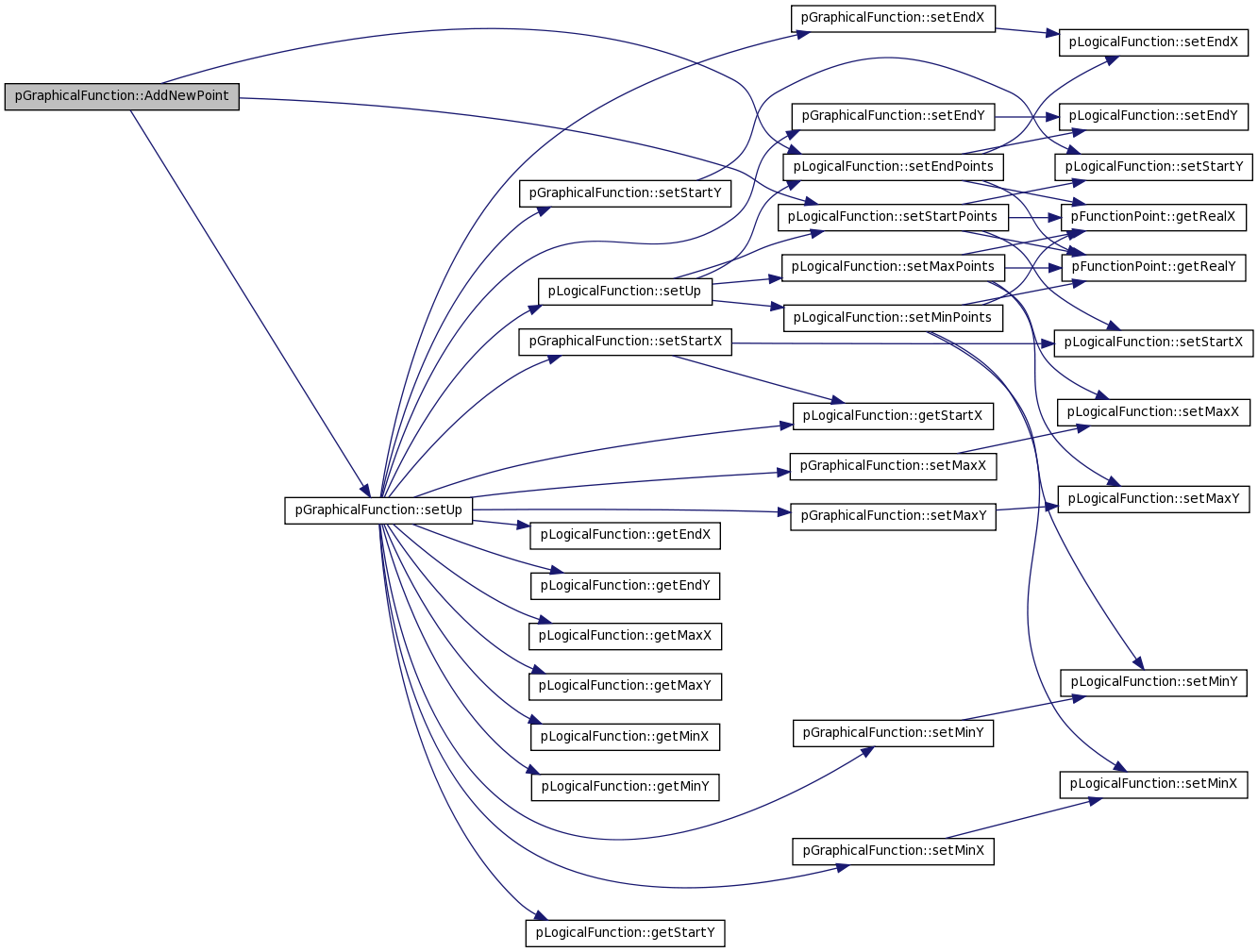

| bool pGraphicalFunction::AddPoint | ( | int | aX, | |
| int | aY, | |||
| bool | order = true | |||
| ) |
this method add a new logical point to the function, this point is one of those used to draw the function
Definition at line 160 of file pGraphicalFunction.cxx.
References fromWindow, logicFunction, pLogicalFunction::setEndPoints(), pLogicalFunction::setStartPoints(), and setUp().
Referenced by HistogramWidget::addPointToTransferenceFunction(), and pPlotterWindow::onAddPoint().
00161 { 00162 bool added=false; 00163 if (logicFunction!=NULL){ 00164 added=logicFunction -> AddPoint( aX, aY,order ); 00165 if(!fromWindow) 00166 setUp(); 00167 else 00168 { 00169 logicFunction->setEndPoints(); 00170 logicFunction->setStartPoints(); 00171 } // if fromWindow 00172 } // if logicFunction 00173 return added; 00174 }
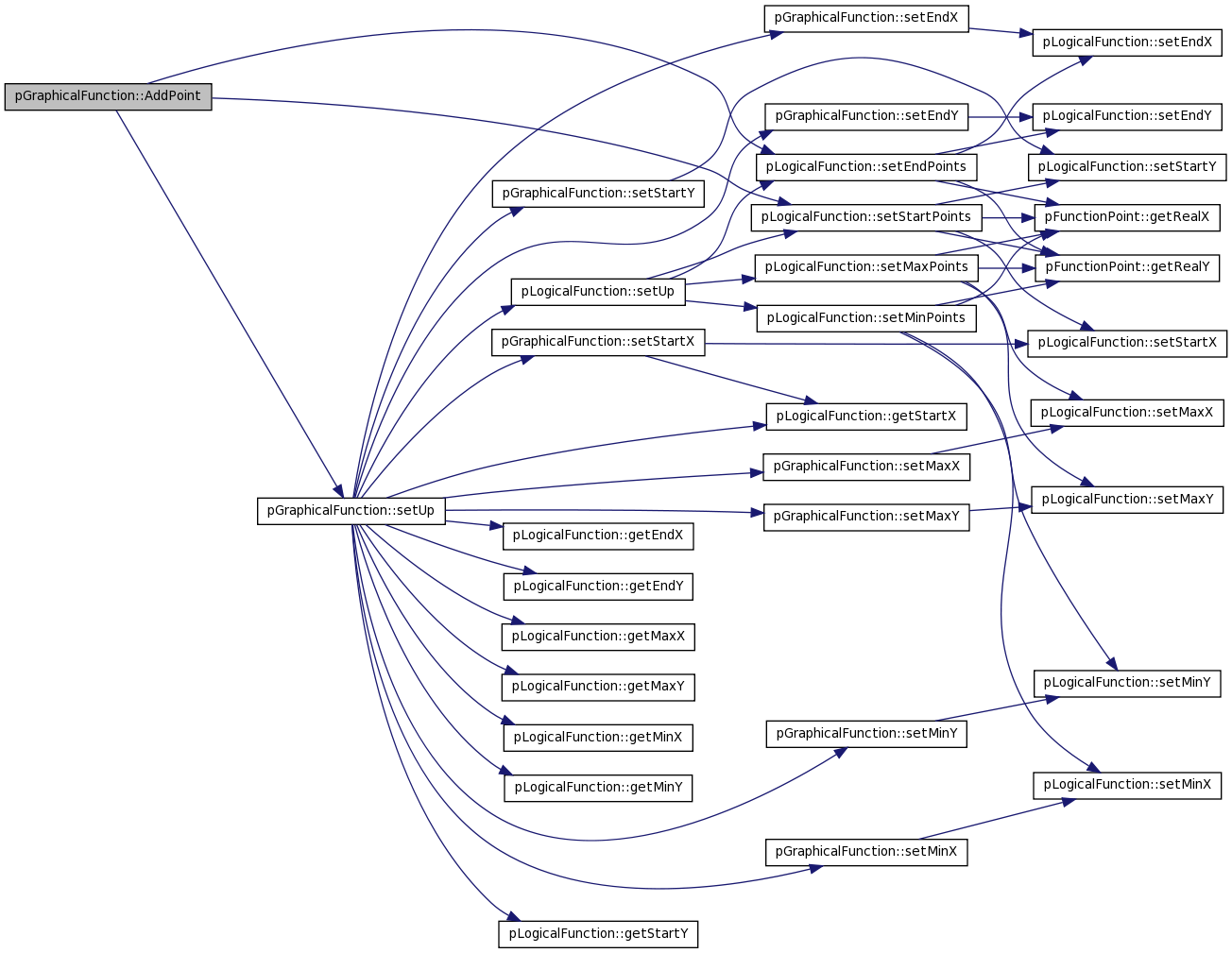

| void pGraphicalFunction::addSplinesPoints | ( | ) |
Definition at line 371 of file pGraphicalFunction.cxx.
References pLogicalFunction::GetPointAt(), pFunctionPoint::getRealX(), pFunctionPoint::getRealY(), logicFunction, node, xKSpline, and yKSpline.
Referenced by initializeSplines(), pPlotterWindow::onAddNewPoint(), pPlotterWindow::onAddPoint(), pPlotterWindow::onChangeActual(), pPlotterWindow::onDeletePoint(), pPlotterWindow::onMouseMove(), and pPlotter::update().
00372 { 00373 xKSpline->RemoveAllPoints(); 00374 yKSpline->RemoveAllPoints(); 00375 wxNode *node= logicFunction->GetPointAt(0); 00376 pFunctionPoint* p; 00377 int i=0; 00378 while(node) 00379 { 00380 p=(pFunctionPoint*)node->GetData(); 00381 xKSpline->AddPoint(i,p->getRealX()); 00382 yKSpline->AddPoint(i,p->getRealY()); 00383 i++; 00384 node=node->GetNext(); 00385 } 00386 }


| bool pGraphicalFunction::changePoint | ( | wxPoint | newCoords, | |
| int | movingIndexPoint | |||
| ) |
Change de coordinates of the given point if it is possible and return the result of the invoked action. True if it was possible to do the change.
Change de coordinates of the given index point to the newCoords, if it is possible and return the result of the invoked action. Return TRUE if it was possible to do the change. A valid change is when the new x value of the point is still between the previous and next point, when condition.
Definition at line 214 of file pGraphicalFunction.cxx.
References fromWindow, logicFunction, pLogicalFunction::setEndPoints(), pLogicalFunction::setStartPoints(), and setUp().
Referenced by pPlotterWindow::onMouseMove().
00215 { 00216 bool added= (logicFunction -> changePoint( newCoords, movingIndexPoint )); 00217 if(!fromWindow) 00218 setUp(); 00219 else 00220 { 00221 logicFunction->setEndPoints(); 00222 logicFunction->setStartPoints(); 00223 } 00224 return added; 00225 }
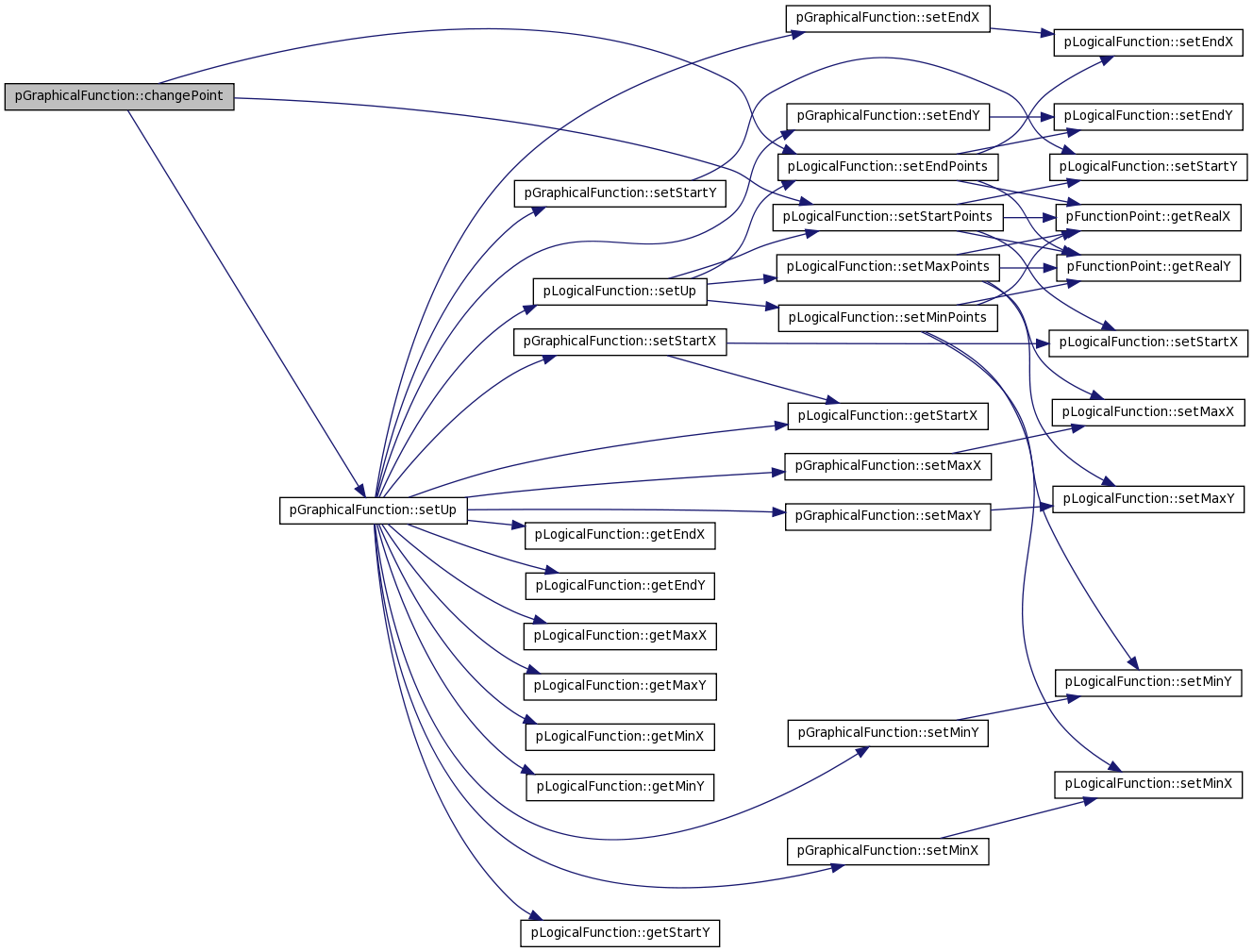

| void pGraphicalFunction::clearSplineVectors | ( | ) |
Definition at line 348 of file pGraphicalFunction.cxx.
References xSpline, and ySpline.
Referenced by pPlotterWindow::onAddNewPoint(), pPlotterWindow::onAddPoint(), pPlotterWindow::onChangeActual(), pPlotterWindow::onDeletePoint(), pPlotterWindow::onLine(), pPlotterWindow::onMouseMove(), and pPlotter::update().

| bool pGraphicalFunction::DeletePoint | ( | int | aX, | |
| int | aY | |||
| ) |
deletes the point given by the user from the collection of logical points of the function
deletes the point given by the user from the collection of logical points of the function is not used
Definition at line 181 of file pGraphicalFunction.cxx.
References fromWindow, logicFunction, pLogicalFunction::setEndPoints(), pLogicalFunction::setStartPoints(), and setUp().
Referenced by pPlotterWindow::DeletePointFunction().
00182 { 00183 bool added= logicFunction -> DeletePoint( aX, aY ); 00184 if(!fromWindow) 00185 setUp(); 00186 else 00187 { 00188 logicFunction->setEndPoints(); 00189 logicFunction->setStartPoints(); 00190 } 00191 return added; 00192 }
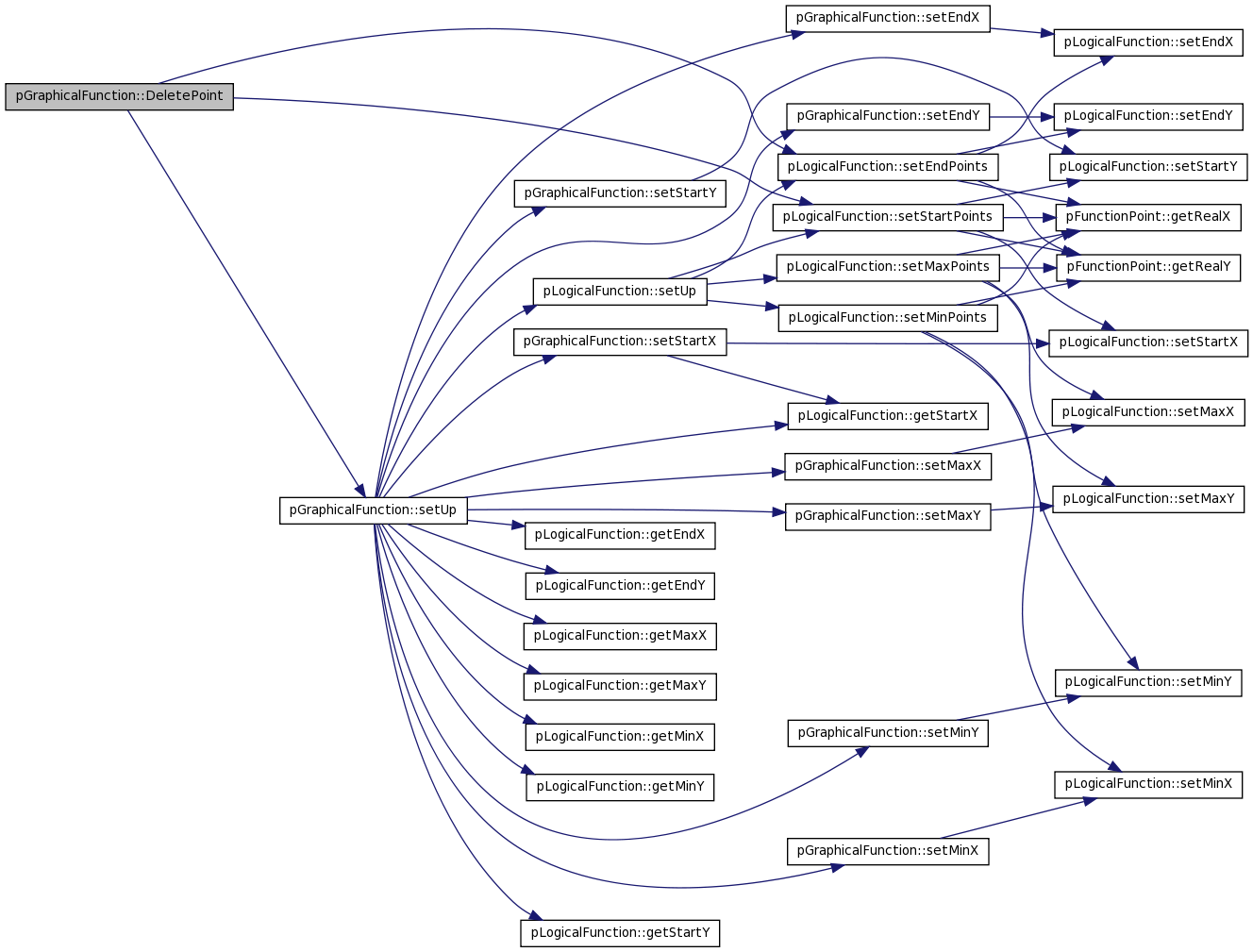

| bool pGraphicalFunction::deletePointAt | ( | int | index | ) |
This method get a pointer to the node in the real points list that is inmediately previous to the searched by parameter.
- Precondition:
- The seached point (realX, realY) is not the first point of the list.
- Parameters:
-
realX realY Deletes a point of the function given its index
Definition at line 197 of file pGraphicalFunction.cxx.
References fromWindow, logicFunction, pLogicalFunction::setEndPoints(), pLogicalFunction::setStartPoints(), and setUp().
Referenced by HistogramWidget::erasePointsTransferenceFunction(), and pPlotterWindow::onDeletePoint().
00198 { 00199 bool added=logicFunction -> deletePointAt( index ); 00200 if(!fromWindow) 00201 setUp(); 00202 else 00203 { 00204 logicFunction->setEndPoints(); 00205 logicFunction->setStartPoints(); 00206 } 00207 return added; 00208 }
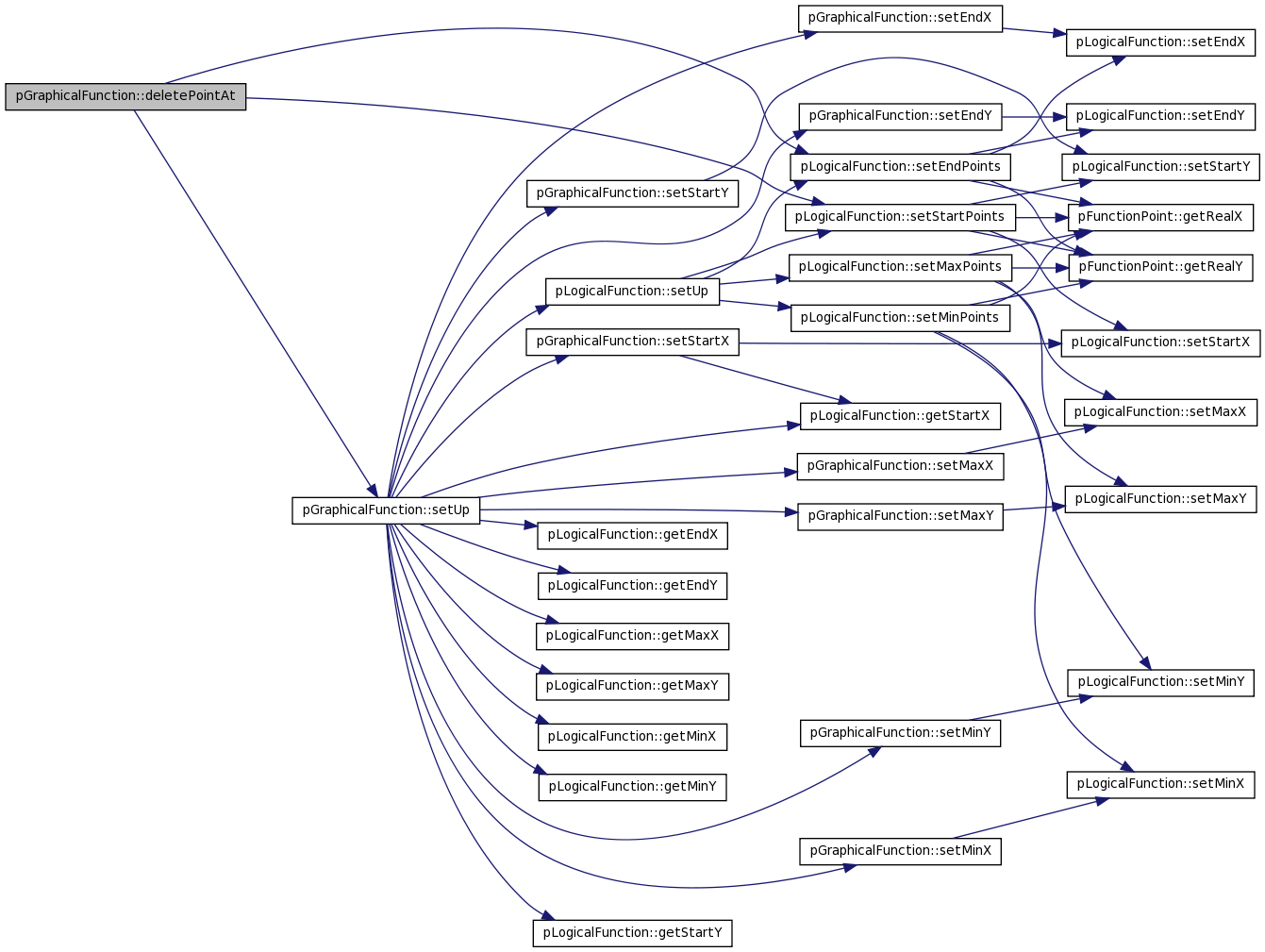

| void pPlotterLayer::draw | ( | wxDC & | dc, | |
| mpWindow & | w, | |||
| double | x1, | |||
| double | y1, | |||
| double | x2, | |||
| double | y2 | |||
| ) | [inherited] |
Definition at line 44 of file pPlotterLayer.cxx.
Referenced by pPlotterLayer::drawFunction(), and pPlotterLayer::drawSplineCurve().
00045 { 00046 00047 //intercepts 00048 float m=((float)(y2-y1))/(x2-x1); 00049 float x0=-y1/m+x1; 00050 float y0=-m*x1+y1; 00051 00052 00053 //analyzing the curve 00054 00055 if(x1<=0 && x2>=0) 00056 { 00057 if(y2>=0 && y1>=0) 00058 dc.DrawLine(0,y0, x2,y2); 00059 00060 else if(y2<=0 && y1>=0) 00061 { 00062 if(y0>=0 && x0>=0) 00063 dc.DrawLine(0,y0,x0,0 ); 00064 } 00065 else if(y2>=0 && y1<=0) 00066 { 00067 if(y0>=0) 00068 dc.DrawLine(0,y0,x2,y2 ); 00069 } 00070 00071 } 00072 00073 if(x1>=0 && x2>=0) 00074 { 00075 if(y1>=0 && y2>=0 ) 00076 dc.DrawLine(x1,y1, x2,y2); 00077 else if(y1>=0 && y2<=0) 00078 dc.DrawLine(x1,y1,x0,0 ); 00079 else if(y1<=0 && y2>=0) 00080 dc.DrawLine(x0,0,x2,y2); 00081 } 00082 00083 00084 }

| void pPlotterLayer::drawFunction | ( | wxDC & | dc, | |
| mpWindow & | w | |||
| ) | [inherited] |
Draw le lines between the points of the function
Draw the lines between the points of the function
Definition at line 285 of file pPlotterLayer.cxx.
References pPlotterLayer::draw(), pPlotterLayer::getMaxShowed(), pPlotterLayer::getMinShowed(), pPlotterLayer::getmType(), pPlotterLayer::getOffsetPixelsXv(), pPlotterLayer::getOffsetPixelsYv(), pPlotterLayer::GetPoints(), pFunctionPoint::getRealX(), pFunctionPoint::getRealY(), pPlotterLayer::initializePolygon(), pPlotterLayer::offsetX, pPlotterLayer::offsetY, pPlotterLayer::points, pPlotterLayer::Rewind(), pPlotterLayer::scaleX, and pPlotterLayer::scaleY.
Referenced by pPlotterLayer::Plot().
00286 { 00287 00288 00289 int scrwX,scrwY,offsetpx,offsetpy,maxX,minX,maxY,minY; 00290 wxPoint* ppoints=NULL; 00291 00292 /* 00293 This is the offset of every point scale to the window 00294 pixel 00295 */ 00296 offsetpx=getOffsetPixelsXv(); 00297 offsetpy=getOffsetPixelsYv(); 00298 00299 Rewind(); 00300 00301 dc.GetSize(&scrwX, &scrwY); 00302 00303 //Lines between the points 00304 00305 GetPoints(points); 00306 00307 // type of plotter 00308 int type=getmType(); 00309 /***********/ 00310 getMaxShowed(maxX,maxY); 00311 getMinShowed(minX,minY); 00312 /***********/ 00313 00314 //traslation 00315 //int xTraslation=getXTraslation(); //JPRx 00316 wxNode* node= points.GetFirst(); 00317 // int i=1;//points.GetCount()+1; //JPRx 00318 int j=2; 00319 /* 00320 Fill it if it is an histogram 00321 */ 00322 wxPoint point; 00323 // pFunctionPoint* pointk; //JPRx 00324 if(type==2) 00325 { 00326 /* 00327 Fill the function if it represented an histogram 00328 */ 00329 ppoints=(wxPoint*)malloc(sizeof(int)*2*(points.GetCount()+2)); 00330 //initialize points 00331 point.x=-5000; 00332 point.y=-5000; 00333 ppoints[0]=point; 00334 ppoints[1]=point; 00335 00336 } 00337 00338 00339 while (node!=NULL && node->GetNext()!=NULL) 00340 { 00341 pFunctionPoint* pointi=(pFunctionPoint*)node->GetData(); 00342 wxNode* nextNode=node->GetNext(); 00343 pFunctionPoint* pointj=(pFunctionPoint*)nextNode->GetData(); 00344 00345 // we do the offset 00346 int pxi=(pointi->getRealX()-minX)-offsetX; 00347 int pyi=(pointi->getRealY()-minY)-offsetY; 00348 int pxj=(pointj->getRealX()-minX)-offsetX; 00349 int pyj=(pointj->getRealY()-minY)-offsetY; 00350 00351 00352 int cxi=pxi* scaleX + offsetpx; //+ xTraslation; 00353 int cxj=pxj* scaleX + offsetpx; //+ xTraslation; 00354 int cyi=pyi* scaleY+ offsetpy ; 00355 int cyj=pyj* scaleY+ offsetpy ; 00356 //dc.DrawLine(pxi* scaleX + offsetpx,pyi* scaleY+ offsetpy, pxj* scaleX + offsetpx,pyj* scaleY+ offsetpy ); 00357 if(type!=2) 00358 draw(dc,w,pxi* scaleX + offsetpx,pyi* scaleY+ offsetpy, pxj* scaleX + offsetpx,pyj* scaleY+ offsetpy ); 00359 //dc.DrawLine(pxi* scaleX + offsetpx,pyi* scaleY+ offsetpy, pxj* scaleX + offsetpx,pyj* scaleY+ offsetpy ); 00360 else if(type==2) 00361 { 00362 if(!initializePolygon(ppoints,cxi,cyi,cxj,cyj) && ((cxi<=0 && cxj>=0)||(cxi>=0 && cxj>=0))) 00363 { 00364 point.x=cxj; 00365 point.y=cyj; 00366 ppoints[j]=point; 00367 j++; 00368 00369 } 00370 } 00371 00372 node=node->GetNext(); 00373 00374 } 00375 if(type==2) 00376 { 00377 //point.x=vx.at(size-1)* scaleX + offsetpx; 00378 point.x=ppoints[j-1].x; 00379 point.y=0; 00380 //ppoints[vx.size()]=point; 00381 ppoints[j]=point; 00382 /* 00383 Fill the function if it represented an histogram 00384 */ 00385 //ppoints=(wxPoint*)malloc(sizeof(int)*2*(vx.size()+1)); 00386 //settings for fill 00387 //point.x=vx.at(0)*scaleX + offsetpx; 00388 point.x=ppoints[0].x; 00389 point.y=0; 00390 //ppoints[vx.size()+1]=point; 00391 ppoints[j+1]=point; 00392 00393 dc.SetBrush(wxBrush( wxColour(239,238,242) ,wxSOLID )); 00394 dc.SetPen(wxPen( wxColour(0,0,0) ,1,wxSOLID )); 00395 //dc.DrawPolygon(vx.size()+2,ppoints,0,0); 00396 dc.DrawPolygon(j+2,ppoints,0,0); 00397 00398 } 00399 00400 }
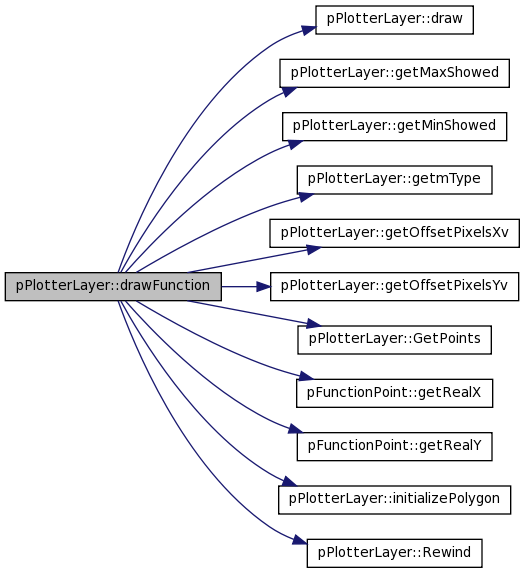

| void pPlotterLayer::drawLineToMousePoint | ( | wxDC & | dc, | |
| mpWindow & | w | |||
| ) | [inherited] |
Draw the line between the last point of the function and the position of the mouse
Definition at line 453 of file pPlotterLayer.cxx.
References mpWindow::drawGuideLines(), pPlotterLayer::getDirection(), pPlotterLayer::getMaxShowed(), pPlotterLayer::getMinShowed(), pPlotterLayer::getMousePoint(), pPlotterLayer::getOffsetPixelsXv(), pPlotterLayer::getOffsetPixelsYv(), pPlotterLayer::GetPoints(), pFunctionPoint::getRealX(), pFunctionPoint::getRealY(), pPlotterLayer::getSize(), pPlotterLayer::offsetX, pPlotterLayer::offsetY, pPlotterLayer::points, pPlotterLayer::Rewind(), pPlotterLayer::scaleX, and pPlotterLayer::scaleY.
Referenced by pPlotterLayer::Plot().
00454 { 00455 int x,y,sizeP,maxX,maxY,minX,minY; 00456 bool direction; 00457 00458 Rewind(); 00459 00460 getMousePoint(x,y); 00461 getDirection(direction); 00462 getSize(sizeP); 00463 //Lines betwen the points 00464 GetPoints(points); 00465 00466 wxNode *node=points.GetLast(); 00467 wxNode *node1=points.GetFirst(); 00468 00469 00470 /* 00471 This is the offset of every point scale to the window 00472 pixel 00473 */ 00474 int offsetpx = getOffsetPixelsXv(); 00475 int offsetpy = getOffsetPixelsYv(); 00476 /***********/ 00477 getMaxShowed(maxX,maxY); 00478 getMinShowed(minX,minY); 00479 /***********/ 00480 //traslation 00481 // int xTraslation=getXTraslation(); //EED 00482 00483 if(node) 00484 { 00485 pFunctionPoint* lastPoint=(pFunctionPoint*)node->GetData(); 00486 pFunctionPoint* firstPoint=(pFunctionPoint*)node1->GetData(); 00487 00488 //LeftDrawing 00489 if(lastPoint->getRealX()<x && direction && sizeP >=2) 00490 00491 dc.DrawLine((lastPoint->getRealX()-minX-offsetX)*scaleX + offsetpx,(lastPoint->getRealY()-minY-offsetY)*scaleY+ offsetpy, (x-minX)*scaleX + offsetpx, (y-minY)*scaleY + offsetpy); 00492 00493 //right drawing 00494 else if(firstPoint->getRealX()>x && !direction && sizeP >=2 ) 00495 00496 dc.DrawLine((firstPoint->getRealX()-minX-offsetX)*scaleX+ offsetpx,(firstPoint->getRealY()-minY-offsetY)*scaleY+ offsetpy,(x-minX)*scaleX+ offsetpx, (y-minY)*scaleY+ offsetpy); 00497 00498 //just a point 00499 else if(sizeP==1 ) 00500 { 00501 dc.DrawLine((lastPoint->getRealX()-minX-offsetX)*scaleX + offsetpx,(lastPoint->getRealY()-minY-offsetY)*scaleY+ offsetpy, (x-minX)*scaleX+ offsetpx, (y-minY)*scaleY+ offsetpy); 00502 } 00503 } 00504 00505 if( w.drawGuideLines() ) 00506 { 00507 dc.SetPen(wxPen( wxColour(255,0,0),1,wxDOT )); 00508 // Drawing the horizontal guide line 00509 dc.DrawLine( 0, (y-minY)*scaleY + offsetpy, (x-minX)*scaleX + offsetpx, (y-minY)*scaleY + offsetpy); 00510 // Drawing the vertical guide line 00511 dc.DrawLine( (x-minX)*scaleX + offsetpx,0, (x-minX)*scaleX + offsetpx, (y-minY)*scaleY + offsetpy); 00512 } 00513 }
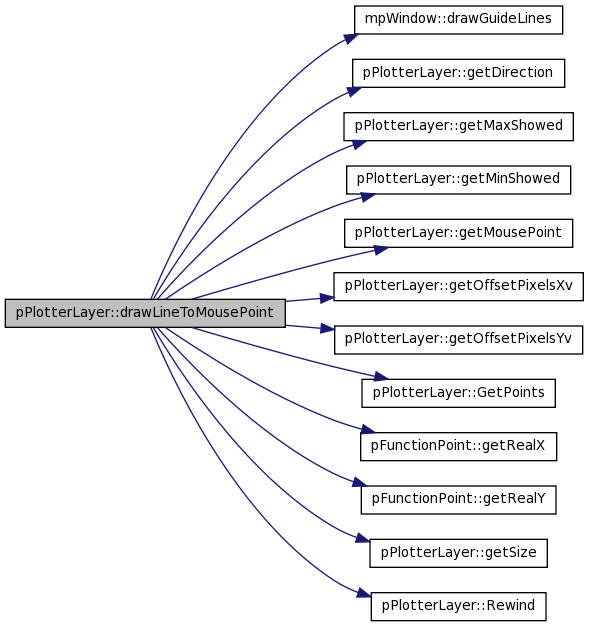

| void pPlotterLayer::drawPoints | ( | wxDC & | dc, | |
| mpWindow & | w | |||
| ) | [inherited] |
Draw the points of the function
Definition at line 405 of file pPlotterLayer.cxx.
References pPlotterLayer::getMaxShowed(), pPlotterLayer::getMinShowed(), pPlotterLayer::GetNextXY(), pPlotterLayer::getOffsetPixelsXv(), pPlotterLayer::getOffsetPixelsYv(), MOVE, pPlotterLayer::offsetX, pPlotterLayer::offsetY, pPlotterLayer::points, pPlotterLayer::Rewind(), pPlotterLayer::scaleX, and pPlotterLayer::scaleY.
Referenced by pPlotterLayer::Plot().
00406 { 00407 00408 Rewind(); 00409 double x, y; 00410 int minX,maxX,minY,maxY; 00411 00412 00413 /* 00414 This is the offset of every point scale to the window 00415 pixel 00416 */ 00417 int offsetpx=getOffsetPixelsXv(); 00418 int offsetpy=getOffsetPixelsYv(); 00419 //traslation 00420 // int xTraslation=getXTraslation(); //EED 00421 /*wxPen mypen(*wxBLACK, 5, wxSOLID); 00422 dc.SetPen(mypen);*/ 00423 /***********/ 00424 getMaxShowed(maxX,maxY); 00425 getMinShowed(minX,minY); 00426 /***********/ 00427 //we have to draw the points 00428 00429 while (GetNextXY(x, y)) 00430 { 00431 //GetNextXY(x, y); 00432 //set the points of the polygons 00433 wxPoint points[4]; 00434 dc.SetBrush(wxBrush( wxColour(255,0,0),wxSOLID )); 00435 //dc.SetPen(wxPen(wxColour(0,0,0),1,wxSOLID) ); 00436 points[0].x=((x-minX-offsetX)*scaleX + offsetpx-MOVE); 00437 points[0].y=((y-minY-offsetY)*scaleY+ offsetpy-MOVE); 00438 points[1].x=((x-minX-offsetX)*scaleX+ offsetpx+MOVE); 00439 points[1].y=((y-minY-offsetY)*scaleY+ offsetpy-MOVE); 00440 points[2].x=((x-minX-offsetX)*scaleX+ offsetpx+MOVE); 00441 points[2].y=((y-minY-offsetY)*scaleY+ offsetpy+MOVE); 00442 points[3].x=((x-minX-offsetX)*scaleX+ offsetpx-MOVE); 00443 points[3].y=((y-minY-offsetY)*scaleY+ offsetpy+MOVE); 00444 if((x-minX-offsetX)*scaleX >=0 && (y-minY-offsetY/*w.getMinScrY()*/)*scaleY>=0) 00445 dc.DrawPolygon(4,points,0,0); 00446 } 00447 }
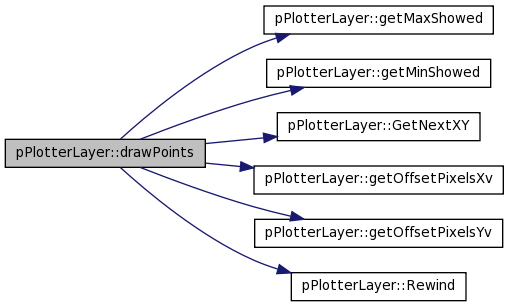

| void pPlotterLayer::drawSplineCurve | ( | wxDC & | dc, | |
| mpWindow & | w | |||
| ) | [inherited] |
Draw the function with th spline points
Definition at line 90 of file pPlotterLayer.cxx.
References pPlotterLayer::draw(), pPlotterLayer::getMaxShowed(), pPlotterLayer::getMinShowed(), pPlotterLayer::getmType(), pPlotterLayer::getOffsetPixelsXv(), pPlotterLayer::getOffsetPixelsYv(), pPlotterLayer::getXSpline(), pPlotterLayer::getYSpline(), pPlotterLayer::initializePolygon(), pPlotterLayer::offsetX, pPlotterLayer::offsetY, pPlotterLayer::scaleX, and pPlotterLayer::scaleY.
Referenced by pPlotterLayer::Plot().
00091 { 00092 std::vector<double> vx=getXSpline(); 00093 std::vector<double> vy=getYSpline(); 00094 wxPoint* ppoints; 00095 00096 int /*counter=0,*/ minX,maxX,minY,maxY; // JPRx 00097 /* 00098 This is the offset of every point scale to the window 00099 pixel 00100 */ 00101 int offsetpx=getOffsetPixelsXv(); 00102 int offsetpy=getOffsetPixelsYv(); 00103 00104 // type of plotter 00105 int type=getmType(); 00106 00107 wxPoint point; 00108 /***********/ 00109 getMaxShowed(maxX,maxY); 00110 getMinShowed(minX,minY); 00111 /***********/ 00112 00113 00114 if(type==2) 00115 { 00116 /* 00117 Fill the function if it represented an histogram 00118 */ 00119 ppoints=(wxPoint*)malloc(sizeof(int)*2*(vx.size()+2)); 00120 //initialize points 00121 point.x=-5000; 00122 point.y=-5000; 00123 ppoints[0]=point; 00124 ppoints[1]=point; 00125 } 00126 00127 int size=vx.size(); 00128 int j=2; 00129 00130 for(int i=0;(i+1)< size;i++) 00131 { 00132 00133 00134 double cxi=(vx.at(i)-minX-offsetX)*scaleX+offsetpx; 00135 double cyi=(vy.at(i)-minY-offsetY)*scaleY+offsetpy; 00136 00137 double cxj=(vx.at(i+1)-minX-offsetX)*scaleX+offsetpx; 00138 double cyj=(vy.at(i+1)-minY-offsetY)*scaleY+offsetpy; 00139 00140 00141 if(type!=2) 00142 draw(dc,w,cxi,cyi,cxj,cyj); 00143 else if(type==2) 00144 { 00145 if(!initializePolygon(ppoints,cxi,cyi,cxj,cyj) && ((cxi<=0 && cxj>=0)||(cxi>=0 && cxj>=0))) 00146 { 00147 point.x=cxj; 00148 point.y=cyj; 00149 ppoints[j]=point; 00150 j++; 00151 00152 } 00153 } 00154 00155 } 00156 if(type==2) 00157 { 00158 //point.x=vx.at(size-1)* scaleX + offsetpx; 00159 point.x=ppoints[j-1].x; 00160 point.y=0; 00161 //ppoints[vx.size()]=point; 00162 ppoints[j]=point; 00163 /* 00164 Fill the function if it represented an histogram 00165 */ 00166 //ppoints=(wxPoint*)malloc(sizeof(int)*2*(vx.size()+1)); 00167 //settings for fill 00168 //point.x=vx.at(0)*scaleX + offsetpx; 00169 point.x=ppoints[0].x; 00170 point.y=0; 00171 //ppoints[vx.size()+1]=point; 00172 ppoints[j+1]=point; 00173 00174 dc.SetBrush(wxBrush( wxColour(239,238,242) ,wxSOLID )); 00175 dc.SetPen(wxPen( wxColour(0,0,0) ,1,wxSOLID )); 00176 //dc.DrawPolygon(vx.size()+2,ppoints,0,0); 00177 dc.DrawPolygon(j+2,ppoints,0,0); 00178 } 00179 00180 00181 }
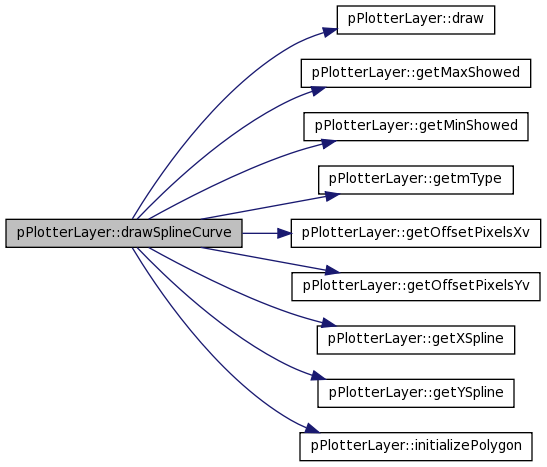

| bool pGraphicalFunction::getActual | ( | ) |
Definition at line 603 of file pGraphicalFunction.cxx.
References ifActual.
Referenced by pPlotterWindow::moveFunctions(), pPlotterWindow::onChangeActual(), pPlotterWindow::onMyZoomIn(), and pPlotterWindow::onMyZoomOut().
00604 { 00605 return ifActual; 00606 }
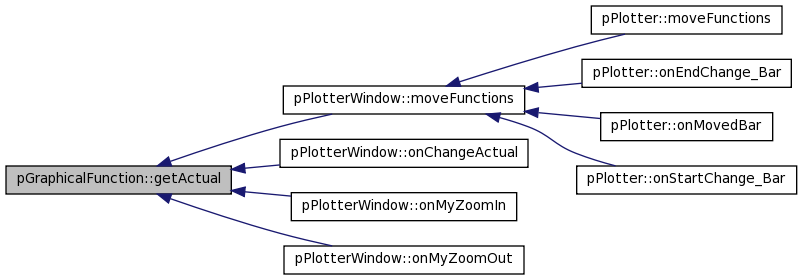
| wxNode * pGraphicalFunction::getBefore | ( | pFunctionPoint * | point | ) |
Definition at line 283 of file pGraphicalFunction.cxx.
References pLogicalFunction::GetPointAt(), pFunctionPoint::getRealX(), logicFunction, and node.
Referenced by isInFunction().
00284 { 00285 int minDiference=10000000; 00286 wxNode* node=logicFunction->GetPointAt(0); 00287 wxNode* before=NULL; 00288 while(node) 00289 { 00290 pFunctionPoint* before1=(pFunctionPoint*)node->GetData(); 00291 int beforeX=before1->getRealX(); 00292 int pointX=point->getRealX(); 00293 if(beforeX<pointX) 00294 { 00295 int minDiference1=pointX-beforeX; 00296 if(minDiference1<minDiference) 00297 { 00298 minDiference=minDiference1; 00299 before=node; 00300 } 00301 } 00302 node=node->GetNext(); 00303 } 00304 return before; 00305 }


| void pGraphicalFunction::getColorPoints | ( | std::vector< pColorPoint * > & | colorVector | ) |
Definition at line 838 of file pGraphicalFunction.cxx.
References f_colorPoints, pColorPoint::getColor(), pColorPoint::getRealX(), and pColorPoint::isTemporalColor().
00839 { 00840 int i = 0; 00841 while(i<(int)(f_colorPoints.size())) 00842 { 00843 pColorPoint * originaslPoint = f_colorPoints[i]; 00844 pColorPoint * copyPoint = new pColorPoint(originaslPoint->getRealX(), originaslPoint->getColor(), originaslPoint->isTemporalColor()); 00845 colorVector.push_back(copyPoint); 00846 i++; 00847 } 00848 }

| virtual void pGraphicalFunction::getDirection | ( | bool & | dir | ) | [inline, virtual] |
this method gets the direction of the drawing
Reimplemented from pPlotterLayer.
Definition at line 280 of file pGraphicalFunction.h.
References logicFunction.
00281 { 00282 logicFunction -> getDirection (dir); 00283 }
| bool pGraphicalFunction::GetDrawing | ( | ) | [inline] |
Definition at line 549 of file pGraphicalFunction.h.
References drawing.
00550 { 00551 return drawing; 00552 }
| virtual void pGraphicalFunction::getDrawing | ( | bool & | draw | ) | [inline, virtual] |
Let us Know if the user has finished the drawing that starts before.
Reimplemented from pPlotterLayer.
Definition at line 207 of file pGraphicalFunction.h.
References drawing.
| bool pGraphicalFunction::getEditable | ( | ) | [inline] |
Get editable
Definition at line 614 of file pGraphicalFunction.h.
References editable.
Referenced by pPlotterWindow::onChangeActual(), and pPlotterWindow::onMouseMove().
00615 { 00616 return editable; 00617 }

| double pGraphicalFunction::getEndX | ( | ) |
Definition at line 677 of file pGraphicalFunction.cxx.
References pLogicalFunction::getEndX(), and logicFunction.
00677 { 00678 return logicFunction->getEndX(); 00679 }

| double pGraphicalFunction::getEndY | ( | ) |
Definition at line 686 of file pGraphicalFunction.cxx.
References pLogicalFunction::getEndY(), and logicFunction.
00686 { 00687 return logicFunction->getEndY(); 00688 }

| virtual void pGraphicalFunction::getFactorZoom | ( | float & | fz | ) | [inline, virtual] |
Reimplemented from pPlotterLayer.
Definition at line 126 of file pGraphicalFunction.h.
References factorZoom.
00127 { 00128 fz=factorZoom; 00129 }
| pFunctionPoint* pGraphicalFunction::getFinallDrawPoint | ( | ) | [inline] |
Get the final drawing point
- Returns:
- finalDrawingPoint
Definition at line 666 of file pGraphicalFunction.h.
References finalDrawingPoint.
00667 { 00668 return finalDrawingPoint; 00669 }
| const wxFont& mpLayer::GetFont | ( | ) | const [inline, inherited] |
Get font set for this layer.
- Returns:
- Font
Definition at line 175 of file mathplot.h.
00175 { return m_font; }
| bool pGraphicalFunction::getFromWindow | ( | ) | [inline] |
Definition at line 593 of file pGraphicalFunction.h.
References fromWindow.
Referenced by pPlotterWindow::onChangeActual(), and pPlotterWindow::onStartDrawing().
00594 { 00595 return fromWindow; 00596 }

| virtual void pGraphicalFunction::getFromWindowV | ( | bool & | fw | ) | [inline, virtual] |
Definition at line 135 of file pGraphicalFunction.h.
References fromWindow.
00136 { 00137 fw=fromWindow; 00138 }
| virtual void pGraphicalFunction::getIfActual | ( | bool & | actual | ) | [inline, virtual] |
if the function that is drawing is the actual
Reimplemented from pPlotterLayer.
Definition at line 144 of file pGraphicalFunction.h.
References ifActual.
00145 { 00146 actual=ifActual; 00147 }
| int pGraphicalFunction::getIndexOf | ( | wxPoint | realpoint | ) |
Definition at line 99 of file pGraphicalFunction.cxx.
References logicFunction.
00100 { 00101 return logicFunction -> getIndexOf( realpoint ); 00102 }
| pFunctionPoint* pGraphicalFunction::getInitialDrawPoint | ( | ) | [inline] |
Get the initial drawing point
- Returns:
- initialDrawingPoint
Definition at line 650 of file pGraphicalFunction.h.
References initialDrawingPoint.
00651 { 00652 return initialDrawingPoint; 00653 }
| virtual void pGraphicalFunction::getMax | ( | int & | maxX, | |
| int & | maxY | |||
| ) | [inline, virtual] |
get the max of the function in x and y
Reimplemented from pPlotterLayer.
Definition at line 152 of file pGraphicalFunction.h.
References getMaxX(), and getMaxY().

| virtual void pGraphicalFunction::getMaxShowed | ( | int & | maxX, | |
| int & | maxY | |||
| ) | [inline, virtual] |
get the maxShowed of the function in x and y
Reimplemented from pPlotterLayer.
Definition at line 160 of file pGraphicalFunction.h.
References getMaxXShowed(), and getMaxYShowed().
00161 { 00162 maxX=(int)getMaxXShowed(); 00163 maxY=(int)getMaxYShowed(); 00164 }

| virtual double mpLayer::GetMaxX | ( | ) | [inline, virtual, inherited] |
Get inclusive right border of bounding box.
- Returns:
- Value
Definition at line 120 of file mathplot.h.
Referenced by mpWindow::UpdateBBox().
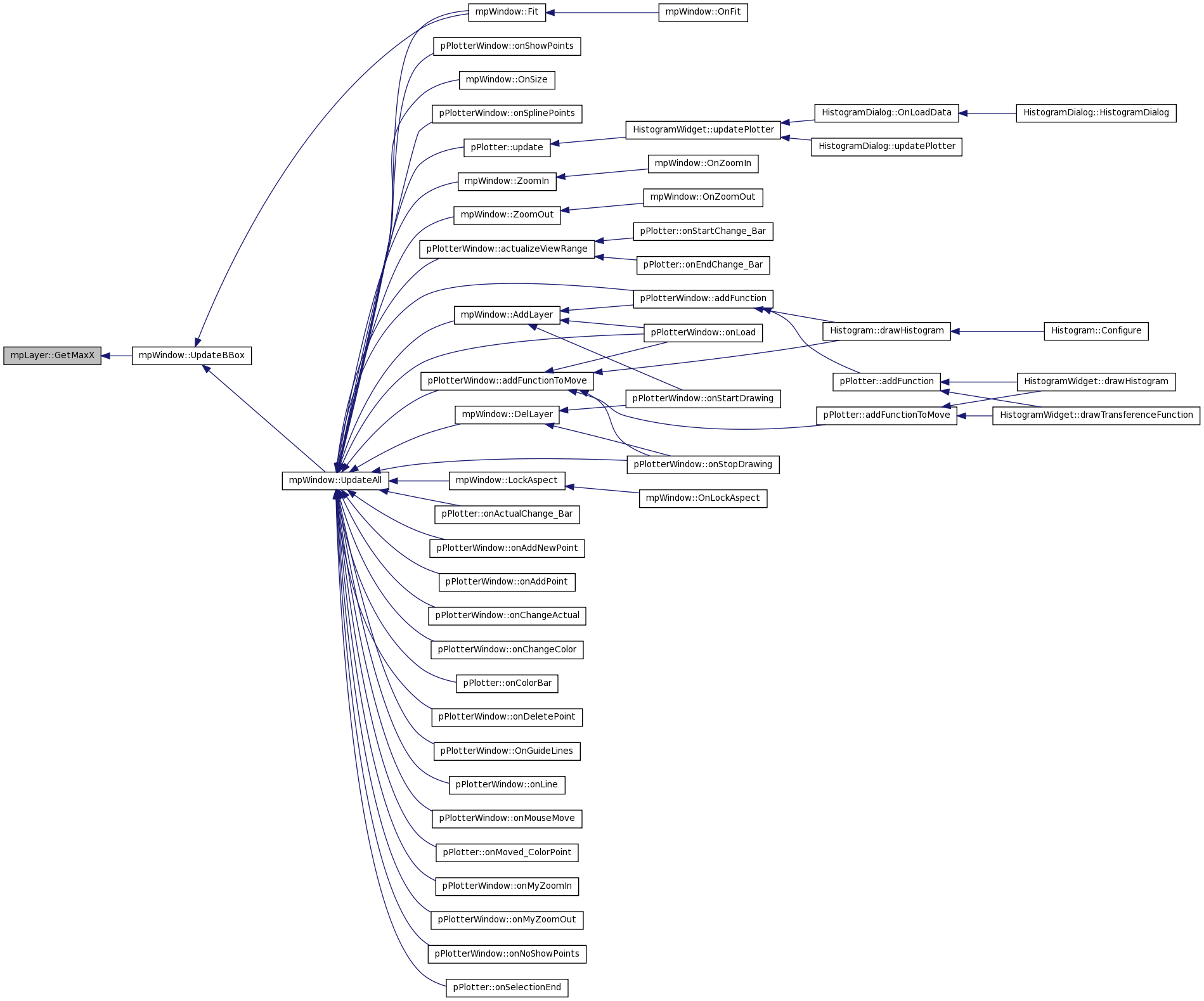
| double pGraphicalFunction::getMaxX | ( | ) |
Definition at line 744 of file pGraphicalFunction.cxx.
References pLogicalFunction::getMaxX(), and logicFunction.
Referenced by HistogramWidget::getActualShowedPorcentage(), getMax(), HistogramWidget::getMaxShowedPorcentage(), HistogramWidget::getMinShowedPorcentage(), pPlotterWindow::InitFunctionForVectors(), pPlotterWindow::moveFunctions(), pPlotter::onChangeFunction(), and pPlotter::setAll().
00745 { 00746 return logicFunction->getMaxX(); 00747 }

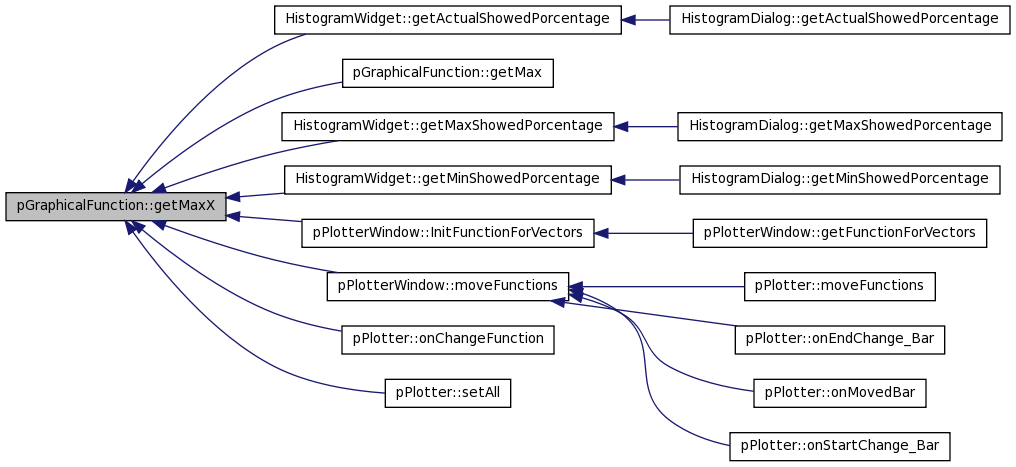
| int pGraphicalFunction::getMaxXShowed | ( | ) | [inline] |
Get the maxX Showed
Definition at line 710 of file pGraphicalFunction.h.
References maxShowedX.
Referenced by getMaxShowed(), pPlotterWindow::moveFunctions(), pPlotterWindow::onChangeActual(), pPlotter::onChangeFunction(), pPlotterWindow::setActualScales(), and pPlotter::setAll().
00711 { 00712 return maxShowedX; 00713 }
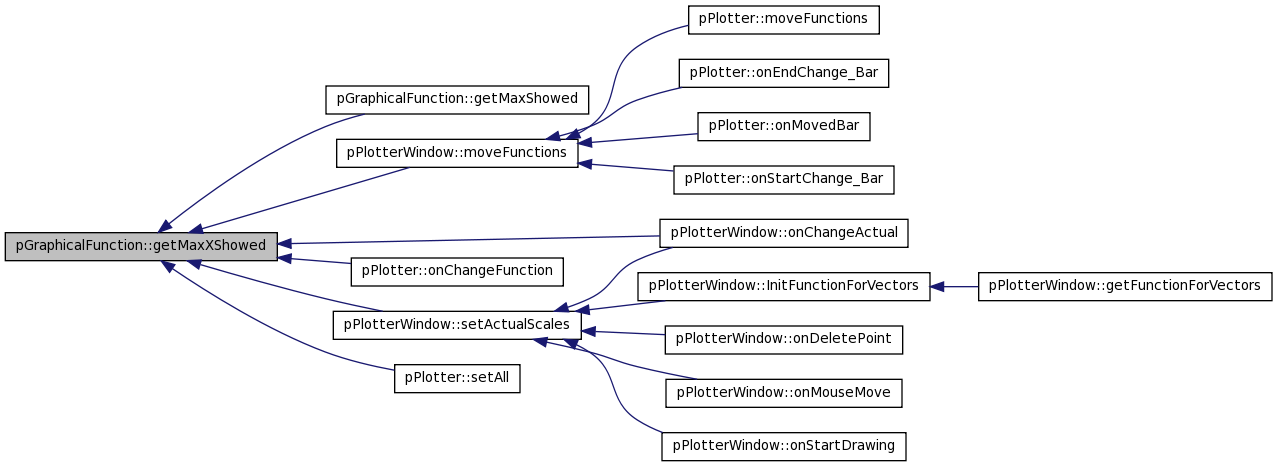
| virtual double mpLayer::GetMaxY | ( | ) | [inline, virtual, inherited] |
Get inclusive top border of bounding box.
- Returns:
- Value
Definition at line 130 of file mathplot.h.
Referenced by mpWindow::UpdateBBox().
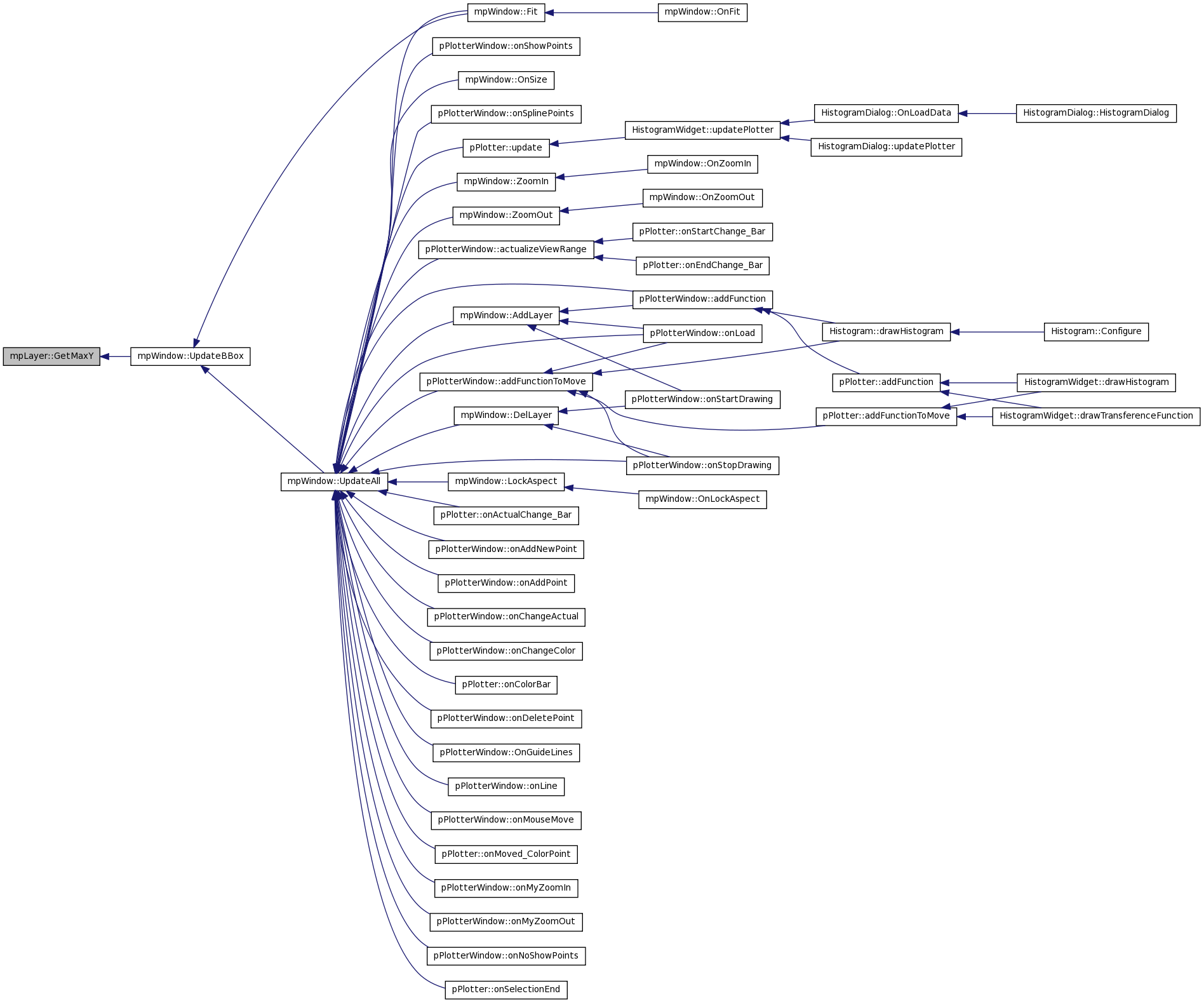
| double pGraphicalFunction::getMaxY | ( | ) |
Definition at line 755 of file pGraphicalFunction.cxx.
References pLogicalFunction::getMaxY(), and logicFunction.
Referenced by getMax(), pPlotterWindow::InitFunctionForVectors(), and pPlotterWindow::moveFunctions().
00755 { 00756 return logicFunction->getMaxY(); 00757 }


| int pGraphicalFunction::getMaxYShowed | ( | ) | [inline] |
Get the maxY Showed
Definition at line 717 of file pGraphicalFunction.h.
References maxShowedY.
Referenced by getMaxShowed(), pPlotterWindow::moveFunctions(), pPlotterWindow::onChangeActual(), and pPlotterWindow::setActualScales().
00718 { 00719 return maxShowedY; 00720 }
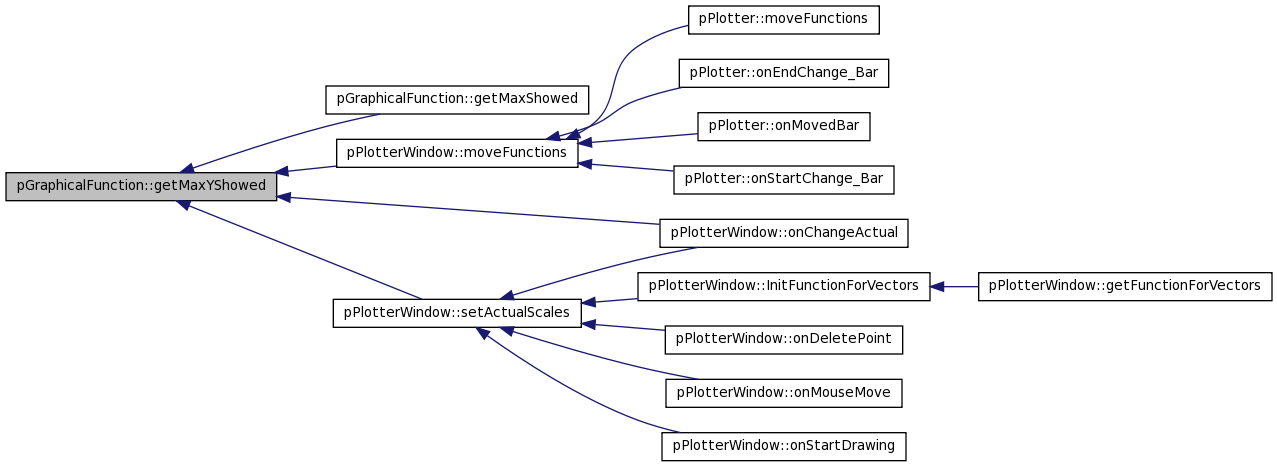
| virtual void pGraphicalFunction::getMinShowed | ( | int & | minX, | |
| int & | minY | |||
| ) | [inline, virtual] |
get the minShowed of the function in x and y
Reimplemented from pPlotterLayer.
Definition at line 168 of file pGraphicalFunction.h.
References getMinXShowed(), and getMinYShowed().
00169 { 00170 minX=(int)getMinXShowed(); 00171 minY=(int)getMinYShowed(); 00172 }

| virtual double mpLayer::GetMinX | ( | ) | [inline, virtual, inherited] |
Get inclusive left border of bounding box.
- Returns:
- Value
Definition at line 115 of file mathplot.h.
Referenced by mpWindow::UpdateBBox().
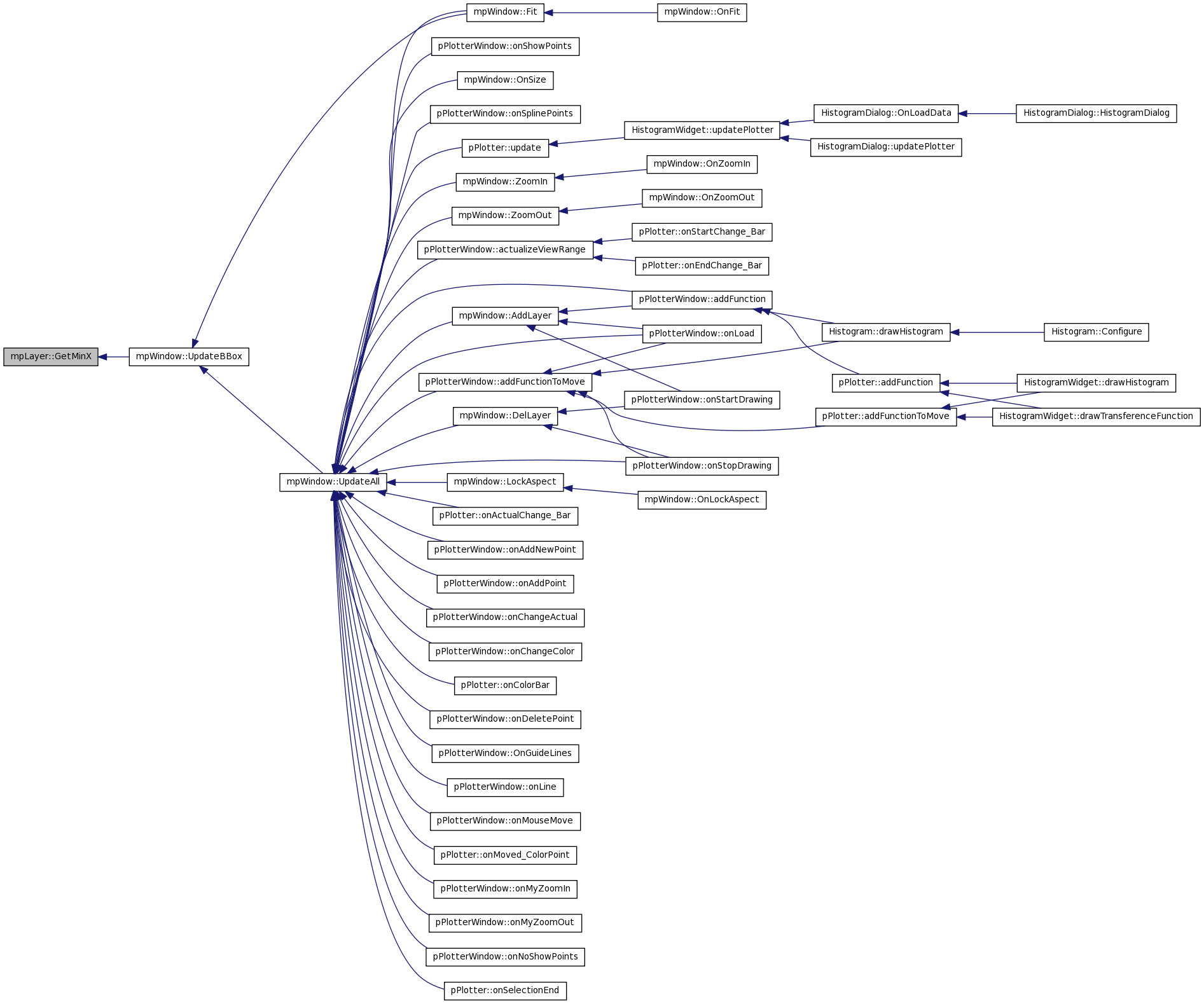
| double pGraphicalFunction::getMinX | ( | ) |
Definition at line 721 of file pGraphicalFunction.cxx.
References pLogicalFunction::getMinX(), and logicFunction.
Referenced by HistogramWidget::getActualShowedPorcentage(), HistogramWidget::getMaxShowedPorcentage(), HistogramWidget::getMinShowedPorcentage(), pPlotterWindow::InitFunctionForVectors(), pPlotterWindow::moveFunctions(), pPlotter::onChangeFunction(), and pPlotter::setAll().
00722 { 00723 return logicFunction->getMinX(); 00724 }

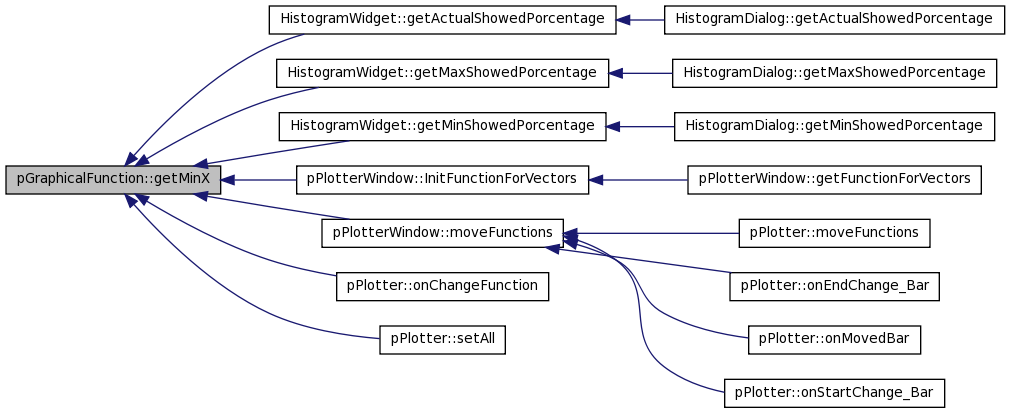
| int pGraphicalFunction::getMinXShowed | ( | ) | [inline] |
Get the minX Showed
Definition at line 696 of file pGraphicalFunction.h.
References minShowedX.
Referenced by getMinShowed(), pPlotterWindow::moveFunctions(), pPlotterWindow::onChangeActual(), pPlotter::onChangeFunction(), pPlotterWindow::setActualScales(), and pPlotter::setAll().
00697 { 00698 return minShowedX; 00699 }
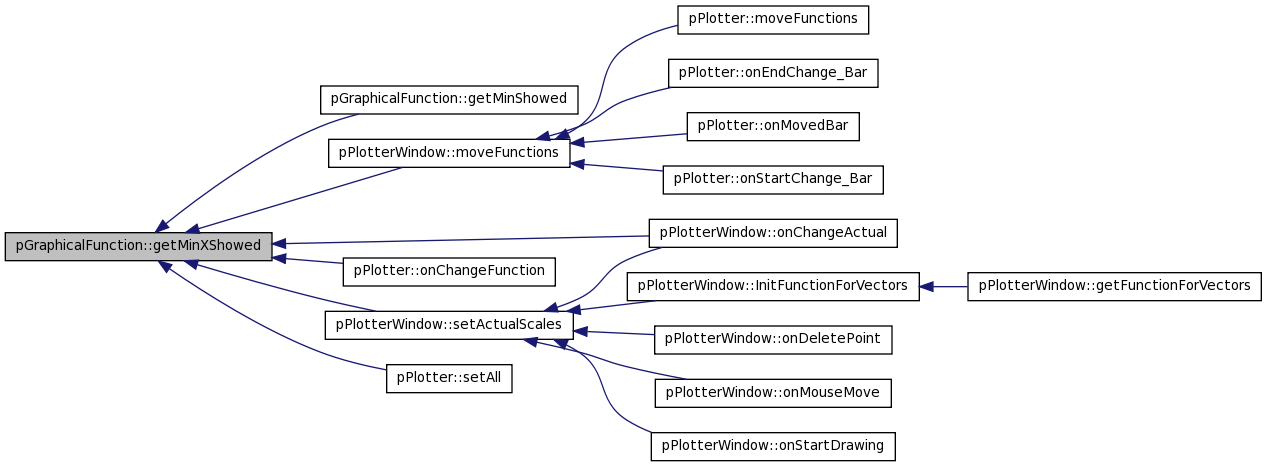
| virtual double mpLayer::GetMinY | ( | ) | [inline, virtual, inherited] |
Get inclusive bottom border of bounding box.
- Returns:
- Value
Definition at line 125 of file mathplot.h.
Referenced by mpWindow::UpdateBBox().
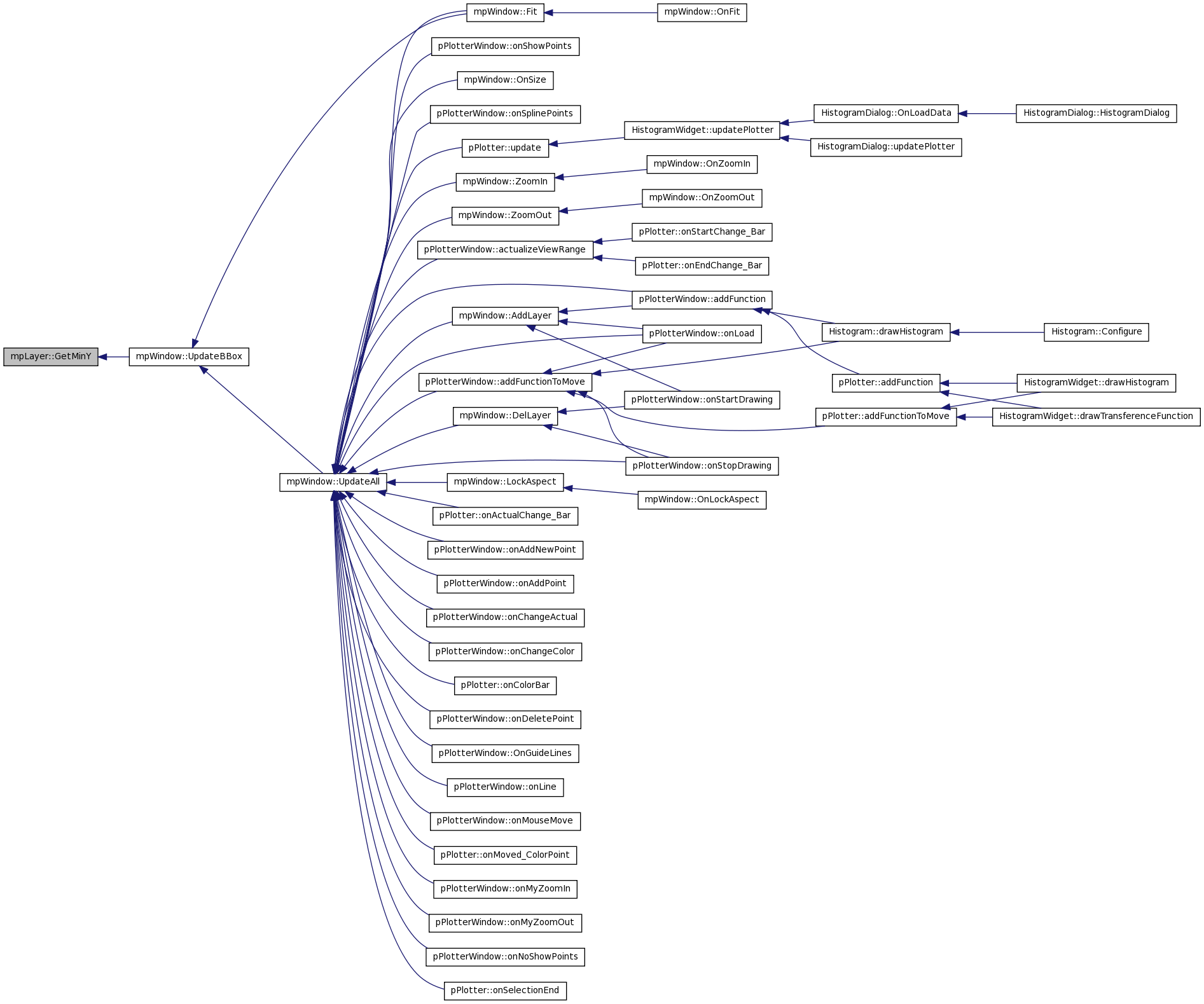
| double pGraphicalFunction::getMinY | ( | ) |
Definition at line 732 of file pGraphicalFunction.cxx.
References pLogicalFunction::getMinY(), and logicFunction.
Referenced by pPlotterWindow::InitFunctionForVectors(), and pPlotterWindow::moveFunctions().
00732 { 00733 return logicFunction->getMinY(); 00734 }


| int pGraphicalFunction::getMinYShowed | ( | ) | [inline] |
Get the minY Showed
Definition at line 703 of file pGraphicalFunction.h.
References minShowedY.
Referenced by getMinShowed(), pPlotterWindow::moveFunctions(), pPlotterWindow::onChangeActual(), and pPlotterWindow::setActualScales().
00704 { 00705 return minShowedY; 00706 }
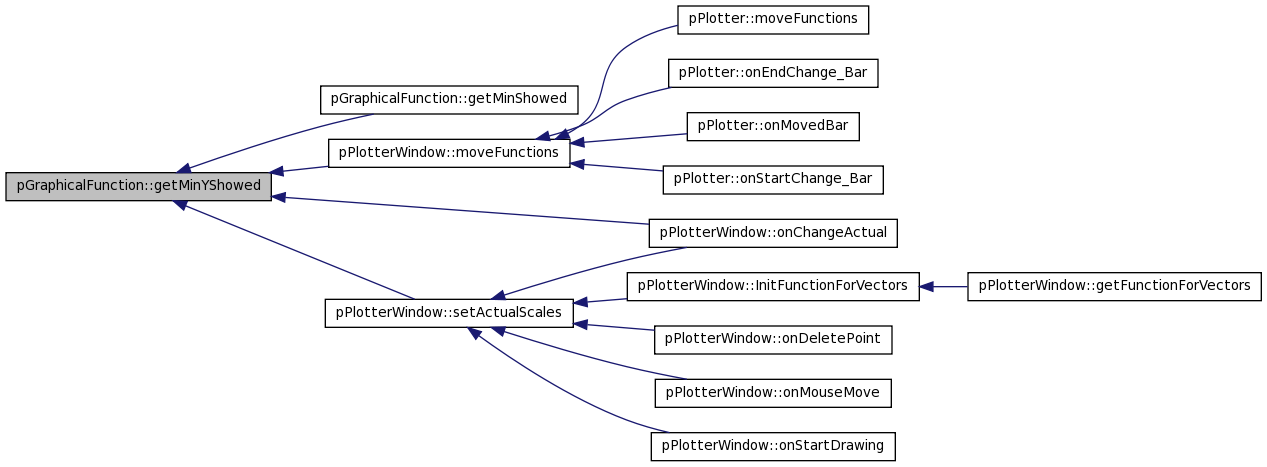
| wxPoint pGraphicalFunction::getMousePoint | ( | ) | [inline] |
Definition at line 560 of file pGraphicalFunction.h.
References mousePoint.
00561 { 00562 return mousePoint; 00563 }
| virtual void pGraphicalFunction::getMousePoint | ( | int & | x, | |
| int & | y | |||
| ) | [inline, virtual] |
Get the point where the user made a click
Reimplemented from pPlotterLayer.
Definition at line 263 of file pGraphicalFunction.h.
References mousePoint.
00264 { 00265 x=mousePoint.x; 00266 y=mousePoint.y; 00267 }
| virtual int pGraphicalFunction::getmType | ( | ) | [inline, virtual] |
Get the type of the curve 1=normal function 2=Histogram
Reimplemented from pPlotterLayer.
Definition at line 98 of file pGraphicalFunction.h.
References mType.
00099 { 00100 return mType; 00101 }
| wxString mpLayer::GetName | ( | ) | const [inline, inherited] |
| virtual bool pGraphicalFunction::GetNextXY | ( | double & | x, | |
| double & | y | |||
| ) | [inline, virtual] |
Get locus value for next N. Override this function in your implementation.
- Parameters:
-
x Returns X value y Returns Y value
Reimplemented from pPlotterLayer.
Definition at line 236 of file pGraphicalFunction.h.
References pFunctionPoint::getRealX(), pFunctionPoint::getRealY(), and node.
00237 { 00238 if(node) 00239 { 00240 pFunctionPoint* p=(pFunctionPoint*)node->GetData(); 00241 x=p->getRealX(); 00242 y=p->getRealY(); 00243 node=node->GetNext(); 00244 return true; 00245 } 00246 return false; 00247 }

| int pGraphicalFunction::getOffsetPixelsX | ( | ) | [inline] |
Gets the x-offset of the zoom in pixels
Definition at line 758 of file pGraphicalFunction.h.
References offsetPixelX.
Referenced by pPlotterWindow::onChangeActual(), pPlotterWindow::onMyZoomIn(), pPlotterWindow::onMyZoomOut(), and pPlotterWindow::onStartDrawing().
00759 { 00760 return offsetPixelX; 00761 }
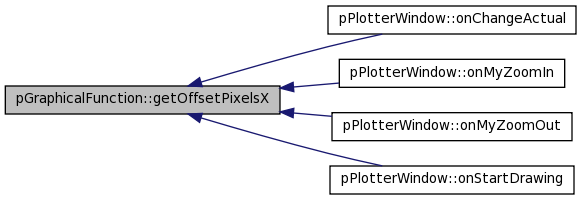
| virtual int pGraphicalFunction::getOffsetPixelsXv | ( | ) | [inline, virtual] |
Gets the x-offset of the zoom in pixels
Reimplemented from pPlotterLayer.
Definition at line 443 of file pGraphicalFunction.h.
References offsetPixelX.
00444 { 00445 return offsetPixelX; 00446 }
| int pGraphicalFunction::getOffsetPixelsY | ( | ) | [inline] |
Gets the offset of the zoom in pixels
Definition at line 767 of file pGraphicalFunction.h.
References offsetPixelY.
Referenced by pPlotterWindow::onChangeActual(), pPlotterWindow::onMyZoomIn(), pPlotterWindow::onMyZoomOut(), and pPlotterWindow::onStartDrawing().
00768 { 00769 return offsetPixelY; 00770 }
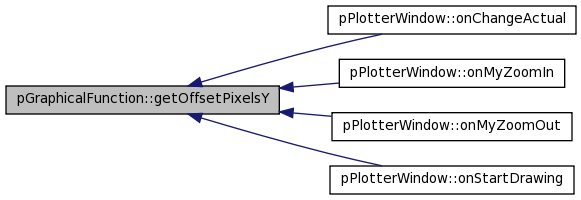
| virtual int pGraphicalFunction::getOffsetPixelsYv | ( | ) | [inline, virtual] |
Gets the offset of the zoom in pixels
Reimplemented from pPlotterLayer.
Definition at line 452 of file pGraphicalFunction.h.
References offsetPixelY.
00453 { 00454 return offsetPixelY; 00455 }
| virtual void pGraphicalFunction::getOffsets | ( | int & | offsetX, | |
| int & | offSetY | |||
| ) | [inline, virtual] |
Get _offsetX and _offsetY
Reimplemented from pPlotterLayer.
Definition at line 117 of file pGraphicalFunction.h.
References _offsetX, _offsetY, and pPlotterLayer::offsetY.
| double pGraphicalFunction::getOffsetX | ( | ) |
Definition at line 768 of file pGraphicalFunction.cxx.
References _offsetX.
Referenced by pPlotterWindow::onChangeActual(), pPlotterWindow::onMyZoomIn(), pPlotterWindow::onMyZoomOut(), and pPlotterWindow::onStartDrawing().
00769 { 00770 00771 return this->_offsetX; 00772 }
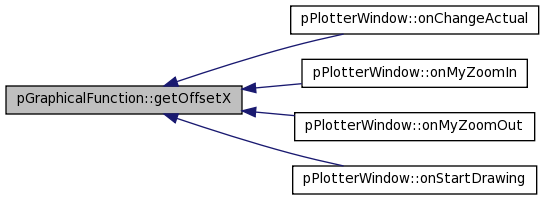
| double pGraphicalFunction::getOffsetY | ( | ) |
Definition at line 780 of file pGraphicalFunction.cxx.
References _offsetY.
Referenced by pPlotterWindow::onChangeActual(), pPlotterWindow::onMyZoomIn(), pPlotterWindow::onMyZoomOut(), and pPlotterWindow::onStartDrawing().
00780 { 00781 return this->_offsetY; 00782 }
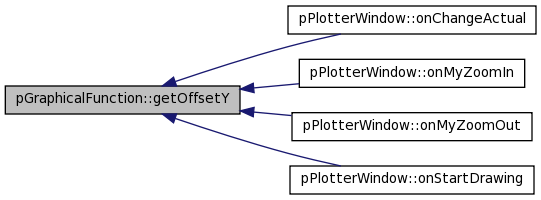
| const wxPen& mpLayer::GetPen | ( | ) | const [inline, inherited] |
Get pen set for this layer.
- Returns:
- Pen
Definition at line 180 of file mathplot.h.
00180 { return m_pen; }
| wxNode * pGraphicalFunction::GetPointAt | ( | int | movingPointIndex | ) |
Definition at line 109 of file pGraphicalFunction.cxx.
References logicFunction.
Referenced by HistogramWidget::getTransferenceFunctionPoint(), and pPlotterWindow::onMouseMove().
00110 { 00111 return logicFunction -> GetPointAt ( movingPointIndex ); 00112 }

| virtual void pGraphicalFunction::GetPoints | ( | wxList & | points | ) | [inline, virtual] |
Get Point list of the funcion
- Parameters:
-
return points
Reimplemented from pPlotterLayer.
Definition at line 252 of file pGraphicalFunction.h.
References pLogicalFunction::GetPoints(), and logicFunction.
00253 { 00254 logicFunction->GetPoints(points); 00255 //points = realPoints; 00256 }

| virtual void pGraphicalFunction::getScales | ( | double & | scaleX, | |
| double & | scaleY | |||
| ) | [inline, virtual] |
Let us know the scale of the function
Reimplemented from pPlotterLayer.
Definition at line 195 of file pGraphicalFunction.h.
References _scaleX, and _scaleY.
| int pGraphicalFunction::getScaleWay | ( | ) |
Definition at line 618 of file pGraphicalFunction.cxx.
References scaleWay.
00619 { 00620 return scaleWay; 00621 }
| double pGraphicalFunction::getScaleX | ( | ) |
Definition at line 698 of file pGraphicalFunction.cxx.
References _scaleX.
00699 { 00700 return this->_scaleX; 00701 }
| double pGraphicalFunction::getScaleY | ( | ) |
Definition at line 709 of file pGraphicalFunction.cxx.
References _scaleY.
00709 { 00710 return this->_scaleY; 00711 }
| virtual void pGraphicalFunction::getScreens | ( | int & | scrX, | |
| int & | scrY | |||
| ) | [inline, virtual] |
Get screens of the function
Reimplemented from pPlotterLayer.
Definition at line 177 of file pGraphicalFunction.h.
References screenX, and screenY.
| int pGraphicalFunction::getScreenX | ( | ) |
Definition at line 631 of file pGraphicalFunction.cxx.
References screenX.
00632 { 00633 return this->screenX; 00634 }
| int pGraphicalFunction::getScreenY | ( | ) |
Definition at line 639 of file pGraphicalFunction.cxx.
References screenY.
00640 { 00641 return this->screenY; 00642 }
| bool pGraphicalFunction::getShowPoints | ( | ) |
Definition at line 67 of file pGraphicalFunction.cxx.
References showPointsF.
Referenced by pPlotterWindow::onChangeActual(), and pPlotterWindow::onStartDrawing().
00068 { 00069 return showPointsF; 00070 }

| virtual void pGraphicalFunction::getSize | ( | int & | size | ) | [inline, virtual] |
Get the number of points of the function
Reimplemented from pPlotterLayer.
Definition at line 272 of file pGraphicalFunction.h.
References getSizePoints().
00273 { 00274 size=getSizePoints(); 00275 }

| int pGraphicalFunction::getSizePoints | ( | ) |
Definition at line 814 of file pGraphicalFunction.cxx.
References pLogicalFunction::getSizePoints(), and logicFunction.
Referenced by HistogramWidget::erasePointsTransferenceFunction(), getSize(), HistogramWidget::getSizeTransferenceFunction(), pPlotterWindow::onDeletePoint(), pPlotterWindow::onMouseMove(), pPlotterWindow::onStopDrawing(), and zooming().
00815 { 00816 return logicFunction->getSizePoints(); 00817 }


| void pGraphicalFunction::GetSplinePoint | ( | double | t, | |
| double & | x, | |||
| double & | y | |||
| ) |
Definition at line 411 of file pGraphicalFunction.cxx.
References pLogicalFunction::getSizePoints(), logicFunction, xKSpline, and yKSpline.
Referenced by initializeSplineVectors().
00412 { 00413 if (logicFunction->getSizePoints()==0) 00414 { 00415 x = 0; 00416 y = 0; 00417 } 00418 if (logicFunction->getSizePoints()>=2) 00419 { 00420 x = xKSpline->Evaluate(t); 00421 y = yKSpline->Evaluate(t); 00422 } 00423 }


| double pGraphicalFunction::getStartX | ( | ) |
Definition at line 654 of file pGraphicalFunction.cxx.
References pLogicalFunction::getStartX(), and logicFunction.
00655 { 00656 return logicFunction->getStartX(); 00657 }

| double pGraphicalFunction::getStartY | ( | ) |
Definition at line 665 of file pGraphicalFunction.cxx.
References pLogicalFunction::getStartY(), and logicFunction.
00665 { 00666 return logicFunction->getStartY(); 00667 }

| int pGraphicalFunction::getType | ( | ) |
Definition at line 793 of file pGraphicalFunction.cxx.
References _type.
Referenced by pPlotterWindow::addFunction(), pPlotterWindow::onAddNewPoint(), pPlotterWindow::onAddPoint(), pPlotterWindow::onChangeActual(), pPlotterWindow::onDeletePoint(), pPlotterWindow::onMouseMove(), and pPlotter::update().
00793 { 00794 return this->_type; 00795 }

| int pGraphicalFunction::getValidPointRange | ( | ) |
Definition at line 800 of file pGraphicalFunction.cxx.
References validPointRange.
00801 { 00802 return validPointRange; 00803 }
| double * pGraphicalFunction::getX_RealValues | ( | ) |
Evaluates if the given point belongs to the function. Returns the real x values of the control points of the function. It dont includes the points calculated by interpolation.
Definition at line 239 of file pGraphicalFunction.cxx.
References logicFunction.
00240 { 00241 return (logicFunction -> getX_RealValues( )); 00242 }
| virtual std::vector<double> pGraphicalFunction::getXSpline | ( | ) | [inline, virtual] |
Reimplemented from pPlotterLayer.
Definition at line 426 of file pGraphicalFunction.h.
References xSpline.
00427 { 00428 return xSpline; 00429 }
| virtual int pGraphicalFunction::getXTraslation | ( | ) | [inline, virtual] |
Get the value of the traslation in the x-axis
Reimplemented from pPlotterLayer.
Definition at line 85 of file pGraphicalFunction.h.
References xTraslation.
00086 { 00087 return xTraslation; 00088 }
| double * pGraphicalFunction::getY_RealValues | ( | ) |
Returns the real y values of the control points of the function. It dont includes the points calculated by interpolation.
Definition at line 247 of file pGraphicalFunction.cxx.
References logicFunction.
00248 { 00249 00250 return (logicFunction -> getY_RealValues()); 00251 }
| virtual std::vector<double> pGraphicalFunction::getYSpline | ( | ) | [inline, virtual] |
Reimplemented from pPlotterLayer.
Definition at line 433 of file pGraphicalFunction.h.
References ySpline.
00434 { 00435 return ySpline; 00436 }
| bool pGraphicalFunction::getZoomB | ( | ) | [inline] |
Definition at line 626 of file pGraphicalFunction.h.
References zoomIn.
00627 { 00628 return zoomIn; 00629 }
| virtual bool mpLayer::HasBBox | ( | ) | [inline, virtual, inherited] |
Check whether this layer has a bounding box. The default implementation returns TRUE. Overide and return FALSE if your mpLayer implementation should be ignored by the calculation of the global bounding box for all layers in a mpWindow.
- Return values:
-
TRUE Has bounding box FALSE Has not bounding box
Reimplemented in mpScaleX, mpScaleY, pPlotterScaleX, and pPlotterScaleY.
Definition at line 110 of file mathplot.h.
Referenced by mpWindow::UpdateBBox().
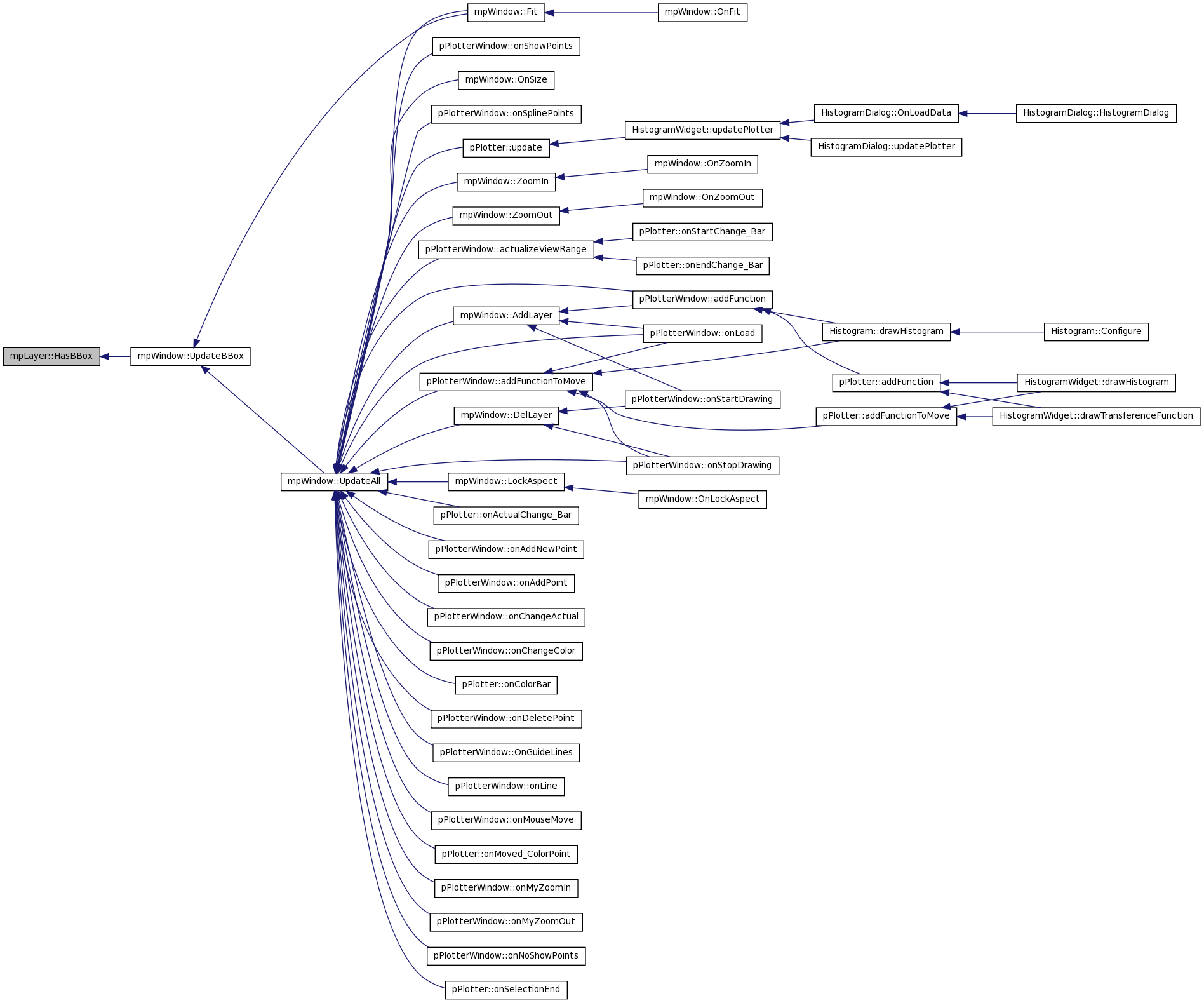
| virtual void pGraphicalFunction::ifShowPoints | ( | bool & | show | ) | [inline, virtual] |
Let us Know if the user want to see the points of the function of other color than the color of the lines
Reimplemented from pPlotterLayer.
Definition at line 216 of file pGraphicalFunction.h.
References showPointsF.
00217 { 00218 show = showPointsF; 00219 }
| bool pPlotterLayer::initializePolygon | ( | wxPoint * | points, | |
| double | x1, | |||
| double | y1, | |||
| double | x2, | |||
| double | y2 | |||
| ) | [inherited] |
Definition at line 187 of file pPlotterLayer.cxx.
Referenced by pPlotterLayer::drawFunction(), and pPlotterLayer::drawSplineCurve().
00188 { 00189 bool setted=false; 00190 00191 //intercepts 00192 float m=((float)(y2-y1))/(x2-x1); 00193 float x0=-y1/m+x1; 00194 float y0=-m*x1+y1; 00195 00196 if(points[0].x<=0&& points[1].x<=0 && points[0].y<=0&& points[1].y<=0) 00197 { 00198 00199 //int offsetpx=getOffsetPixelsXv(); //JPRx 00200 00201 //analyzing the curve 00202 00203 if(x1<=0 && x2>=0) 00204 { 00205 if(y2>=0 && y1>=0) 00206 { 00207 //dc.DrawLine(0,y0, x2,y2); 00208 points[0].x=0; 00209 points[0].y=y0; 00210 points[1].x=x2; 00211 points[1].y=y2; 00212 setted=true; 00213 00214 } 00215 else if(y2<=0 && y1>=0) 00216 { 00217 if(y0>=0 && x0>=0) 00218 { 00219 //dc.DrawLine(0,y0,x0,0 ); 00220 points[0].x=0; 00221 points[0].y=y0; 00222 points[1].x=x0; 00223 points[1].y=0; 00224 setted=true; 00225 00226 } 00227 00228 } 00229 else if(y2>=0 && y1<=0) 00230 { 00231 if(y0>=0) 00232 { 00233 //dc.DrawLine(0,y0,x2,y2 ); 00234 points[0].x=0; 00235 points[0].y=y0; 00236 points[1].x=x2; 00237 points[1].y=y2; 00238 setted=true; 00239 } 00240 } 00241 00242 } 00243 00244 if(x1>=0 && x2>=0) 00245 { 00246 if(y1>=0 && y2>=0 ) 00247 { 00248 //dc.DrawLine(x1,y1, x2,y2); 00249 points[0].x=x1; 00250 points[0].y=y1; 00251 points[1].x=x2; 00252 points[1].y=y2; 00253 setted=true; 00254 } 00255 else if(y1>=0 && y2<=0) 00256 { 00257 //dc.DrawLine(x1,y1,x0,0 ); 00258 points[0].x=x1; 00259 points[0].y=y1; 00260 points[1].x=x0; 00261 points[1].y=0; 00262 setted=true; 00263 } 00264 else if(y1<=0 && y2>=0) 00265 { 00266 //dc.DrawLine(x0,0,x2,y2); 00267 points[0].x=x0; 00268 points[0].y=0; 00269 points[1].x=x2; 00270 points[1].y=y2; 00271 setted=true; 00272 } 00273 } 00274 else 00275 return setted; 00276 } 00277 else 00278 return setted; 00279 return setted; 00280 }

| void pGraphicalFunction::initializeSplines | ( | ) |
Definition at line 357 of file pGraphicalFunction.cxx.
References addSplinesPoints(), xKSpline, and yKSpline.
Referenced by pPlotterWindow::addFunction(), and pPlotterWindow::onSplinePoints().
00358 { 00359 if(xKSpline==NULL) 00360 xKSpline = vtkKochanekSpline::New(); 00361 if(yKSpline==NULL) 00362 yKSpline= vtkKochanekSpline::New(); 00363 addSplinesPoints(); 00364 00365 }


| void pGraphicalFunction::initializeSplineVectors | ( | ) |
Definition at line 391 of file pGraphicalFunction.cxx.
References pLogicalFunction::getSizePoints(), GetSplinePoint(), logicFunction, xSpline, and ySpline.
Referenced by pPlotterWindow::addFunction(), pPlotterWindow::onAddNewPoint(), pPlotterWindow::onAddPoint(), pPlotterWindow::onChangeActual(), pPlotterWindow::onDeletePoint(), pPlotterWindow::onMouseMove(), pPlotterWindow::onSplinePoints(), and pPlotter::update().
00392 { 00393 double x=0,y=0,t,delta; 00394 int i,np,nps; 00395 //realPoints.DeleteC 00396 00397 np = logicFunction->getSizePoints(); 00398 nps = 100; 00399 delta=( double ) ( np ) / ( double ) ( nps ); 00400 for( i = 0; i < nps; i++ ) 00401 { 00402 t = delta * (double)i; 00403 GetSplinePoint(t,x,y); 00404 xSpline.push_back(x); 00405 ySpline.push_back(y); 00406 } 00407 }


| double pGraphicalFunction::interpolateY | ( | double | m, | |
| int | x1, | |||
| int | y1, | |||
| int | x | |||
| ) |
give us the value of y in the line define by the arguments
Definition at line 331 of file pGraphicalFunction.cxx.
| bool pGraphicalFunction::isInFunction | ( | int | x, | |
| int | y | |||
| ) |
Definition at line 261 of file pGraphicalFunction.cxx.
References getBefore(), and isInLine().
Referenced by pPlotterWindow::onChangeActual(), and pPlotterWindow::onMouseMove().
00262 { 00263 wxNode* before; 00264 wxNode* next; 00265 pFunctionPoint* point= new pFunctionPoint(x,y); 00266 bool inLine; 00267 before=getBefore(point); 00268 00269 if(before && before->GetNext()) 00270 { 00271 next = before->GetNext(); 00272 //next = (before->GetNext())->GetNext(); 00273 inLine= isInLine((pFunctionPoint*)before->GetData(),(pFunctionPoint*)next->GetData(),point); 00274 } 00275 else 00276 inLine=false; 00277 return inLine; 00278 }


| bool pGraphicalFunction::isInLine | ( | pFunctionPoint * | before, | |
| pFunctionPoint * | next, | |||
| pFunctionPoint * | point | |||
| ) |
Definition at line 309 of file pGraphicalFunction.cxx.
References pFunctionPoint::getRealX(), and pFunctionPoint::getRealY().
Referenced by isInFunction().
00310 { 00311 int x1,x2,x,y1,y2,y; 00312 00313 x1=(float)before->getRealX(); 00314 x2=(float)next->getRealX(); 00315 y1=(float)before->getRealY(); 00316 y2=(float)next->getRealY(); 00317 x=(float)point->getRealX(); 00318 y=(float)point->getRealY(); 00319 00320 00321 float d1= (float)sqrt(pow(float(x1-x),2)+ pow(float(y1-y),2)); 00322 float d2= (float)sqrt(pow(float(x2-x),2)+ pow(float(y2-y),2)); 00323 float d=(float)sqrt(pow(float(x2-x1),2)+ pow(float(y2-y1),2)); 00324 if(d1+d2<=(d*1.1) && d1<=d && d2<=d) 00325 return true; 00326 return false; 00327 }


| void pGraphicalFunction::load | ( | wxString | fileName | ) |
Definition at line 583 of file pGraphicalFunction.cxx.
References pLogicalFunction::getMaxX(), pLogicalFunction::getMaxY(), pLogicalFunction::getMinX(), pLogicalFunction::getMinY(), pLogicalFunction::load(), logicFunction, setMaxShowedX(), setMaxShowedY(), setMinShowedX(), setMinShowedY(), and pLogicalFunction::setUp().
Referenced by pPlotterWindow::onLoad().
00584 { 00585 logicFunction->load(fileName); 00586 logicFunction->setUp(); 00587 setMaxShowedX(logicFunction->getMaxX()); 00588 setMinShowedX(logicFunction->getMinX()); 00589 setMaxShowedY(logicFunction->getMaxY()); 00590 setMinShowedY(logicFunction->getMinY()); 00591 }
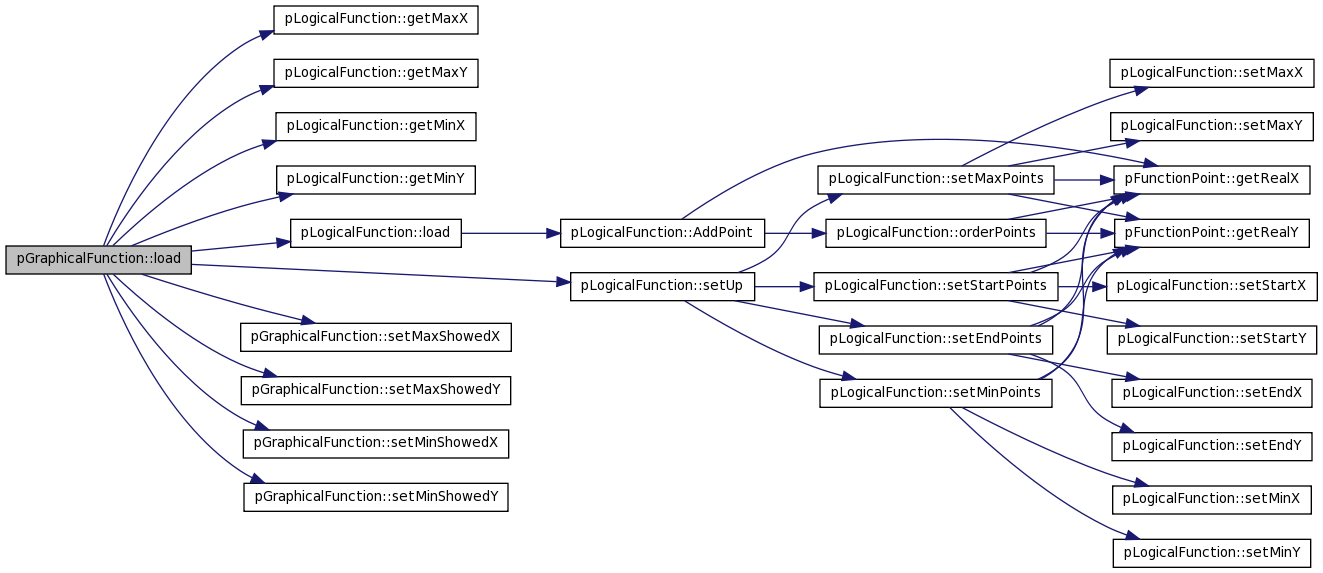

| bool pGraphicalFunction::orderPoints | ( | ) |
| void pPlotterLayer::Plot | ( | wxDC & | dc, | |
| mpWindow & | w | |||
| ) | [virtual, inherited] |
Layer plot handler. This implementation will plot the locus in the visible area and put a label according to the aligment specified.
Layer plot handler. This implementation will plot the locus in the visible area and put a label according to the aligment specified.
Implements mpLayer.
Reimplemented in pPlotterScaleX, and pPlotterScaleY.
Definition at line 521 of file pPlotterLayer.cxx.
References pPlotterLayer::drawFunction(), pPlotterLayer::drawLineToMousePoint(), pPlotterLayer::drawPoints(), pPlotterLayer::drawSplineCurve(), pPlotterLayer::getDrawing(), pPlotterLayer::getFactorZoom(), pPlotterLayer::getIfActual(), pPlotterLayer::getMaxShowed(), pPlotterLayer::getMinShowed(), pPlotterLayer::getOffsetPixelsXv(), pPlotterLayer::getOffsets(), mpWindow::getRealGuideX(), mpWindow::getRealGuideY(), pPlotterLayer::ifShowPoints(), mpLayer::m_pen, pPlotterLayer::offsetX, pPlotterLayer::offsetY, pPlotterLayer::scaleX, pPlotterLayer::scaleY, mpWindow::SetScaleX(), mpWindow::SetScaleY(), and pPlotterLayer::vGetType().
00522 { 00523 bool show,drawing,actual; 00524 int scrwX,scrwY,maxX,maxY,minX,minY,type; 00525 float factorZoom; 00526 00527 ifShowPoints(show); 00528 getDrawing(drawing); 00529 type=vGetType(); 00530 00531 dc.SetPen( m_pen); 00532 00533 /* 00534 * Managing the scale and zoom 00535 */ 00536 00537 dc.GetSize(&scrwX, &scrwY); 00538 getIfActual(actual); 00539 //getMax(maxX, maxY); 00540 /***********/ 00541 getMaxShowed(maxX,maxY); 00542 getMinShowed(minX,minY); 00543 /***********/ 00544 getFactorZoom(factorZoom); 00545 getOffsets(offsetX,offsetY); 00546 /* 00547 maxX=w.getMaxScrX(); 00548 maxY=w.getMaxScrY(); 00549 minX=w.getMinScrX(); 00550 minY=w.getMinScrY(); 00551 */ 00552 if((maxX-minX)!=0 && (maxY-minY)!=0) 00553 { 00554 00555 scaleX=(((double)scrwX-100)/(maxX-minX))*factorZoom; 00556 scaleY=(((double)scrwY-50)/(maxY-minY))*factorZoom; 00557 00558 if(actual) 00559 { 00560 w.SetScaleX(scaleX); 00561 w.SetScaleY(scaleY); 00562 //w.setMinScrX(offsetX); 00563 //w.setMinScrY(offsetY); 00564 } 00565 00566 } 00567 /* 00568 Managing the drawing 00569 */ 00570 int orgx=70; 00571 00572 00573 //EED 14Mai2009 00574 // int orgy=w.GetScrY()-40; 00575 // dc.SetDeviceOrigin( orgx ,orgy); 00576 // dc.SetAxisOrientation(true,true); 00577 00578 int orgy = 40; 00579 dc.SetDeviceOrigin( orgx ,orgy); 00580 dc.SetAxisOrientation(true,false); 00581 00582 00583 00584 //if the user dont want to see the points of the function and if he stops drawing 00585 //we have to draw the function 00586 if(!show && !drawing && type==1) 00587 drawFunction(dc,w); 00588 else if(!show && !drawing && type==2) 00589 drawSplineCurve(dc,w); 00590 //we just draw the point that the user just clicked 00591 else if(drawing && type==1) 00592 { 00593 drawFunction(dc,w); 00594 drawLineToMousePoint(dc,w); 00595 drawPoints(dc,w); 00596 } 00597 else if(drawing && type==1) 00598 { 00599 drawSplineCurve(dc,w); 00600 drawLineToMousePoint(dc,w); 00601 drawPoints(dc,w); 00602 } 00603 else if(show && type==1) 00604 { 00605 drawFunction(dc,w); 00606 drawPoints(dc,w); 00607 } 00608 else if(show && type==2) 00609 { 00610 drawSplineCurve(dc,w); 00611 drawPoints(dc,w); 00612 } 00613 00614 // Drawing the guides according to real values entered according to the integrated interaction (IS NOT WORKING!!!) 00615 if ( actual ) 00616 { 00617 dc.SetPen(wxPen( wxColour(255,0,0),1,wxDOT )); 00618 int offsetpx = getOffsetPixelsXv(); 00619 // int offsetpy = getOffsetPixelsYv(); //EED 00620 00621 int realX_guide = w.getRealGuideX(); 00622 if( realX_guide!=-1 ) 00623 { 00624 dc.DrawLine( (realX_guide/*-w.getMinScrX()*/-offsetX)*scaleX + offsetpx, 0, (realX_guide/*-w.getMinScrX()*/-offsetX)*scaleX + offsetpx, scrwY); 00625 } 00626 00627 int realY_guide = w.getRealGuideY(); 00628 if( realY_guide!=-1 ) 00629 { 00630 dc.DrawLine( 0,(realY_guide/*-w.getMinScrY()*/-offsetX)*scaleX + offsetpx, scrwX, (realY_guide/*-w.getMinScrY()*/-offsetX)*scaleX + offsetpx); 00631 } 00632 } 00633 00634 }
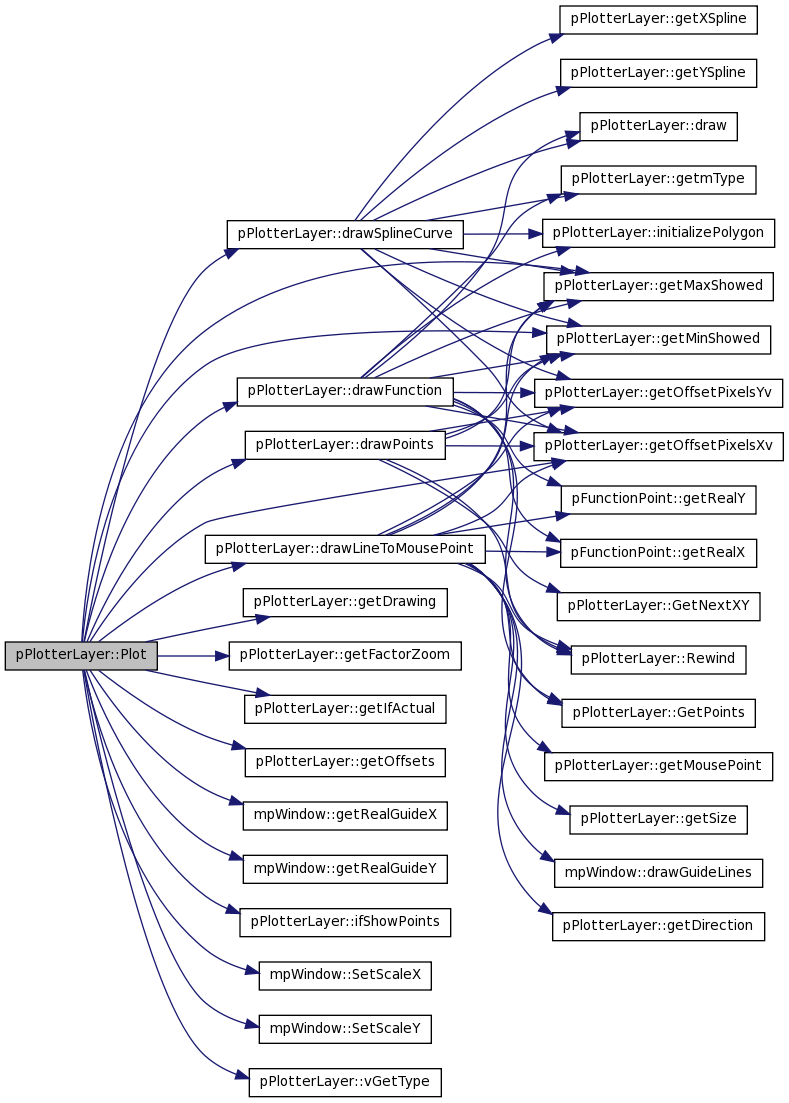
| virtual void pGraphicalFunction::Rewind | ( | ) | [inline, virtual] |
Rewind
Reimplemented from pPlotterLayer.
Definition at line 224 of file pGraphicalFunction.h.
References pLogicalFunction::GetPointAt(), logicFunction, and node.
00225 { 00226 00227 node = logicFunction->GetPointAt(0); 00228 00229 }

| void pGraphicalFunction::save | ( | wxString | fileName | ) |
Definition at line 574 of file pGraphicalFunction.cxx.
References logicFunction, and pLogicalFunction::save().
Referenced by pPlotterWindow::onSave().
00575 { 00576 00577 logicFunction->save(fileName); 00578 00579 }


| void pGraphicalFunction::setActual | ( | bool | act | ) |
actual
Definition at line 599 of file pGraphicalFunction.cxx.
References ifActual.
Referenced by HistogramWidget::drawTransferenceFunction(), pPlotterWindow::onLoad(), pPlotterWindow::onStartDrawing(), and pPlotterWindow::setActualFunction().
00600 { 00601 ifActual=act; 00602 }

| void pGraphicalFunction::setColorPoints | ( | std::vector< pColorPoint * > & | colorVector | ) |
Definition at line 823 of file pGraphicalFunction.cxx.
References f_colorPoints.
00824 { 00825 f_colorPoints.clear(); 00826 int i = 0; 00827 while(i<(int)(colorVector.size())) 00828 { 00829 f_colorPoints.push_back(colorVector[i]); 00830 i++; 00831 } 00832 }
| void pGraphicalFunction::SetDrawing | ( | bool | d | ) | [inline] |
Definition at line 544 of file pGraphicalFunction.h.
References drawing.
Referenced by pPlotterWindow::onLoad(), pPlotterWindow::onStartDrawing(), and pPlotterWindow::onStopDrawing().
00545 { 00546 drawing = d; 00547 }

| void pGraphicalFunction::setEditable | ( | bool | edit | ) | [inline] |
Definition at line 607 of file pGraphicalFunction.h.
References editable.
Referenced by HistogramWidget::drawHistogram(), and Histogram::drawHistogram().
00608 { 00609 editable=edit; 00610 }

| void pGraphicalFunction::setEndX | ( | double | aEndX | ) |
Definition at line 671 of file pGraphicalFunction.cxx.
References _endX, logicFunction, and pLogicalFunction::setEndX().
Referenced by setUp().
00672 { 00673 logicFunction->setEndX(aEndX); 00674 this->_endX = aEndX; 00675 }


| void pGraphicalFunction::setEndY | ( | double | aEndY | ) |
Definition at line 681 of file pGraphicalFunction.cxx.
References _endY, logicFunction, and pLogicalFunction::setEndY().
Referenced by setUp().
00681 { 00682 logicFunction->setEndY(aEndY); 00683 this->_endY = aEndY; 00684 }


| void pGraphicalFunction::setFactorZoom | ( | float | factor | ) | [inline] |
Definition at line 600 of file pGraphicalFunction.h.
References factorZoom.
Referenced by pPlotterWindow::onLoad(), pPlotterWindow::onMyZoomIn(), pPlotterWindow::onMyZoomOut(), and pPlotterWindow::onStartDrawing().
00601 { 00602 factorZoom=factor; 00603 }
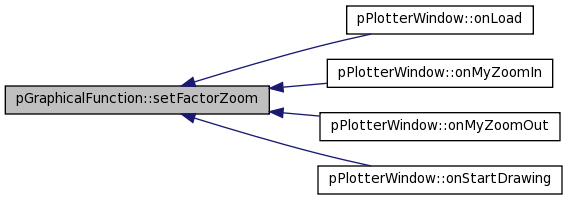
| void pGraphicalFunction::setFinalDrawPoint | ( | pFunctionPoint * | finalPoint | ) | [inline] |
Set the final drawing point
- Parameters:
-
pFunctionPoint* finalPoint
Definition at line 658 of file pGraphicalFunction.h.
References finalDrawingPoint.
00659 { 00660 finalDrawingPoint=finalPoint; 00661 }
| void mpLayer::SetFont | ( | wxFont & | font | ) | [inline, inherited] |
Set layer font
- Parameters:
-
font Font, will be copied to internal class member
Definition at line 190 of file mathplot.h.
00190 { m_font = font; }
| void pGraphicalFunction::setFromWindow | ( | bool | w | ) | [inline] |
set fromWindow: it is set to true if the function was created interactively
Definition at line 585 of file pGraphicalFunction.h.
References fromWindow.
Referenced by pPlotterWindow::onLoad(), and pPlotterWindow::onStartDrawing().
00586 { 00587 fromWindow=w; 00588 }

| void pGraphicalFunction::setInitialDrawPoint | ( | pFunctionPoint * | initialPoint | ) | [inline] |
Set the initial drawing point
- Parameters:
-
pFunctionPoint* initialPoint
Definition at line 642 of file pGraphicalFunction.h.
References initialDrawingPoint.
00643 { 00644 initialDrawingPoint=initialPoint; 00645 }
| void pGraphicalFunction::setMaxShowedX | ( | int | msx | ) | [inline] |
Set the maxShowedX
Definition at line 738 of file pGraphicalFunction.h.
References maxShowedX.
Referenced by pPlotterWindow::actualizeViewRange(), pPlotterWindow::InitFunctionForVectors(), load(), pPlotterWindow::moveFunctions(), and pPlotterWindow::onStartDrawing().
00739 { 00740 maxShowedX=msx; 00741 }
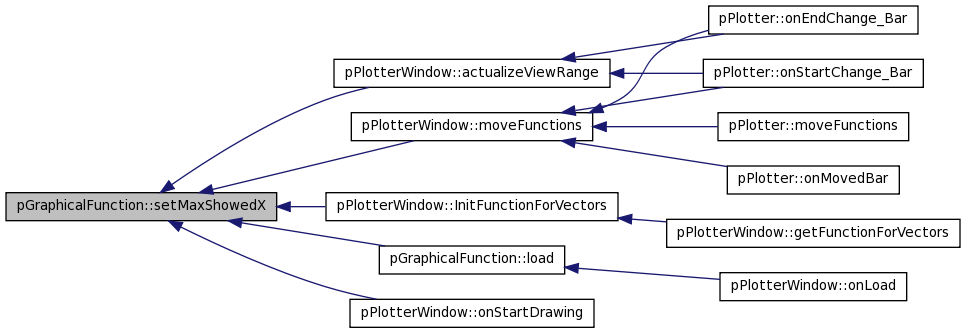
| void pGraphicalFunction::setMaxShowedY | ( | int | msy | ) | [inline] |
Set the minShowedY
Definition at line 745 of file pGraphicalFunction.h.
References maxShowedY.
Referenced by pPlotterWindow::InitFunctionForVectors(), load(), and pPlotterWindow::onStartDrawing().
00746 { 00747 maxShowedY=msy; 00748 }

| void pGraphicalFunction::setMaxX | ( | double | aMaxX | ) |
Definition at line 738 of file pGraphicalFunction.cxx.
References _maxX, logicFunction, and pLogicalFunction::setMaxX().
Referenced by pPlotterWindow::onStartDrawing(), and setUp().
00739 { 00740 logicFunction->setMaxX(aMaxX); 00741 this->_maxX = aMaxX; 00742 }


| void pGraphicalFunction::setMaxY | ( | double | aMaxY | ) |
Definition at line 749 of file pGraphicalFunction.cxx.
References _maxY, logicFunction, and pLogicalFunction::setMaxY().
Referenced by pPlotterWindow::onStartDrawing(), and setUp().
00750 { 00751 logicFunction->setMaxY(aMaxY); 00752 this->_maxY = aMaxY; 00753 }


| void pGraphicalFunction::setMinShowed | ( | ) |
Definition at line 535 of file pGraphicalFunction.cxx.
References _offsetX, _offsetY, pLogicalFunction::GetPointAt(), pFunctionPoint::getRealX(), pFunctionPoint::getRealY(), logicFunction, node, setMinShowedX(), and setMinShowedY().
00536 { 00537 bool firstX=false,firstY=false; 00538 00539 wxNode* node=logicFunction->GetPointAt(0); 00540 pFunctionPoint* p; 00541 00542 //float middleWX=(((float)(screenX-100))/2)/scaleX; // JPRx 00543 //float middleWY=(((float)(screenY-50))/2)/scaleY; // JPRx 00544 00545 //node=node->GetNext(); 00546 while(node) 00547 { 00548 p=(pFunctionPoint*)node->GetData(); 00549 int px=p->getRealX(); 00550 int py=p->getRealY(); 00551 int x=(px-_offsetX);//+middleWX; 00552 int y=(py-_offsetY);//+middleWY; 00553 if(!firstX && x>=0) 00554 { 00555 firstX=true; 00556 setMinShowedX(px); 00557 } 00558 if(!firstY && y>=0) 00559 { 00560 firstY=true; 00561 setMinShowedY(py); 00562 } 00563 node=node->GetNext(); 00564 } 00565 }
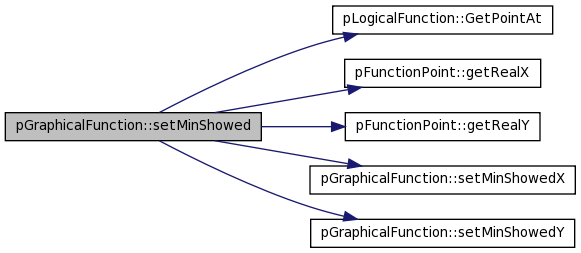
| void pGraphicalFunction::setMinShowedX | ( | int | msx | ) | [inline] |
Set the minShowedX
Definition at line 724 of file pGraphicalFunction.h.
References minShowedX.
Referenced by pPlotterWindow::actualizeViewRange(), pPlotterWindow::InitFunctionForVectors(), load(), pPlotterWindow::moveFunctions(), pPlotterWindow::onStartDrawing(), and setMinShowed().
00725 { 00726 minShowedX=msx; 00727 }
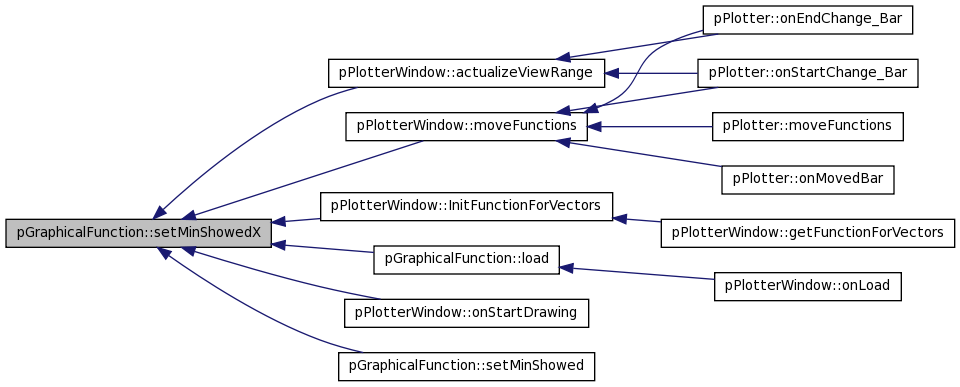
| void pGraphicalFunction::setMinShowedY | ( | int | msy | ) | [inline] |
Set the minShowedY
Definition at line 731 of file pGraphicalFunction.h.
References minShowedY.
Referenced by pPlotterWindow::InitFunctionForVectors(), load(), pPlotterWindow::onStartDrawing(), and setMinShowed().
00732 { 00733 minShowedY=msy; 00734 }

| void pGraphicalFunction::setMinX | ( | double | aMinX | ) |
Definition at line 715 of file pGraphicalFunction.cxx.
References _minX, logicFunction, and pLogicalFunction::setMinX().
Referenced by pPlotterWindow::onStartDrawing(), and setUp().
00716 { 00717 logicFunction->setMinX(aMinX); 00718 this->_minX = aMinX; 00719 }


| void pGraphicalFunction::setMinY | ( | double | aMinY | ) |
Definition at line 726 of file pGraphicalFunction.cxx.
References _minY, logicFunction, and pLogicalFunction::setMinY().
Referenced by pPlotterWindow::onStartDrawing(), and setUp().
00727 { 00728 logicFunction->setMinY(aMinY); 00729 this->_minY = aMinY; 00730 }


| void pGraphicalFunction::SetMousePoint | ( | wxPoint | p | ) | [inline] |
Definition at line 555 of file pGraphicalFunction.h.
References mousePoint.
Referenced by pPlotterWindow::onMouseMove().
00556 { 00557 mousePoint = p; 00558 }

| void pGraphicalFunction::setmType | ( | int | mt | ) | [inline] |
Definition at line 802 of file pGraphicalFunction.h.
References mType.
Referenced by HistogramWidget::drawHistogram(), and Histogram::drawHistogram().
00803 { 00804 mType=mt; 00805 }

| void mpLayer::SetName | ( | wxString | name | ) | [inline, inherited] |
Set layer name
- Parameters:
-
name Name, will be copied to internal class member
Definition at line 185 of file mathplot.h.
00185 { m_name = name; }
| void pGraphicalFunction::setOffsetPixelX | ( | int | offX | ) | [inline] |
Set the x-offset of the zoom
Definition at line 774 of file pGraphicalFunction.h.
References offsetPixelX.
Referenced by pPlotterWindow::onMyZoomIn(), pPlotterWindow::onMyZoomOut(), and setOffsets().
00775 { 00776 offsetPixelX=offX; 00777 }

| void pGraphicalFunction::setOffsetPixelY | ( | int | offY | ) | [inline] |
Set the y-offset of the zoom
Definition at line 781 of file pGraphicalFunction.h.
References offsetPixelY.
Referenced by pPlotterWindow::onMyZoomIn(), pPlotterWindow::onMyZoomOut(), and setOffsets().
00782 { 00783 offsetPixelY=offY; 00784 }

| void pGraphicalFunction::setOffsets | ( | int | offx, | |
| int | offy | |||
| ) |
Definition at line 507 of file pGraphicalFunction.cxx.
References _offsetX, _offsetY, _scaleX, _scaleY, minShowedX, minShowedY, offsetPixelX, offsetPixelY, setOffsetPixelX(), setOffsetPixelY(), setOffsetX(), setOffsetY(), and setScales().
Referenced by pPlotterWindow::onMyZoomIn(), and pPlotterWindow::onMyZoomOut().
00508 { 00509 int xS,yS; 00510 00511 setScales(); 00512 00513 xS=(offx-offsetPixelX)/_scaleX+_offsetX + minShowedX; 00514 yS=(offy-offsetPixelY)/_scaleY+_offsetY+ minShowedY; 00515 00516 setOffsetX(xS); 00517 setOffsetY(yS); 00518 00519 //setMinShowedX(xS); 00520 //setMinShowedY(yS); 00521 00522 setOffsetPixelX(offx); 00523 setOffsetPixelY(offy); 00524 //setMinShowed(); 00525 }
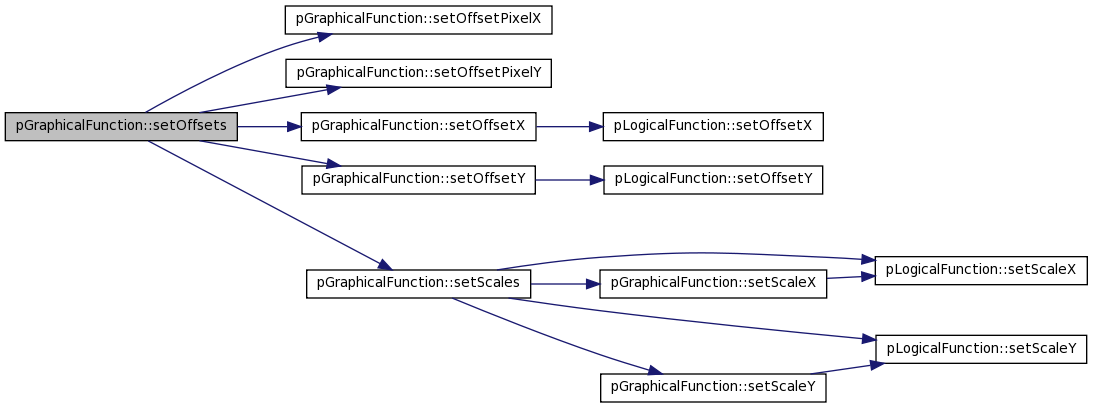

| void pGraphicalFunction::setOffsetX | ( | double | aOffsetX | ) |
Definition at line 762 of file pGraphicalFunction.cxx.
References _offsetX, logicFunction, and pLogicalFunction::setOffsetX().
Referenced by pPlotterWindow::actualizeViewRange(), pPlotterWindow::moveFunctions(), pPlotterWindow::onMyZoomIn(), pPlotterWindow::onMyZoomOut(), and setOffsets().
00763 { 00764 logicFunction->setOffsetX(aOffsetX); 00765 this->_offsetX = aOffsetX; 00766 }

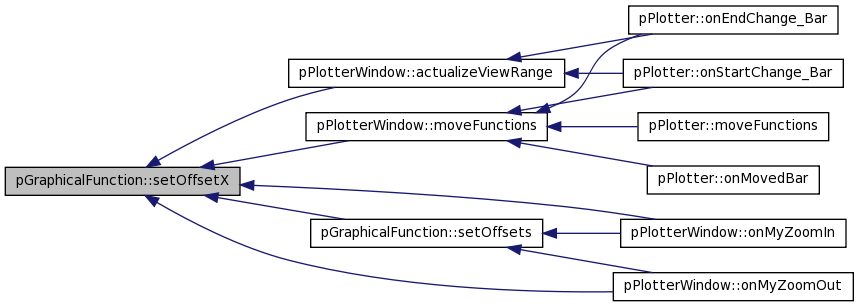
| void pGraphicalFunction::setOffsetY | ( | double | aOffsetY | ) |
Definition at line 774 of file pGraphicalFunction.cxx.
References _offsetY, logicFunction, and pLogicalFunction::setOffsetY().
Referenced by pPlotterWindow::onMyZoomIn(), pPlotterWindow::onMyZoomOut(), and setOffsets().
00775 { 00776 logicFunction->setOffsetY(aOffsetY); 00777 this->_offsetY = aOffsetY; 00778 }


| void mpLayer::SetPen | ( | wxPen & | pen | ) | [inline, inherited] |
Set layer pen
- Parameters:
-
pen Pen, will be copied to internal class member
Definition at line 195 of file mathplot.h.
Referenced by HistogramWidget::drawHistogram(), Histogram::drawHistogram(), HistogramWidget::drawTransferenceFunction(), pPlotterWindow::onChangeColor(), pPlotterWindow::onLoad(), and pPlotterWindow::onStartDrawing().
00195 { m_pen = pen; }
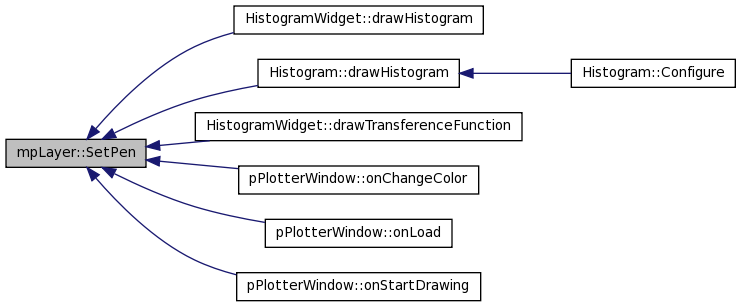
| void pGraphicalFunction::setScales | ( | ) |
Definition at line 117 of file pGraphicalFunction.cxx.
References factorZoom, logicFunction, maxShowedX, maxShowedY, minShowedX, minShowedY, pPlotterLayer::scaleX, pPlotterLayer::scaleY, screenX, screenY, pLogicalFunction::setScaleX(), setScaleX(), pLogicalFunction::setScaleY(), and setScaleY().
Referenced by HistogramWidget::OnSize(), pPlotterWindow::setActualScales(), setOffsets(), and zooming().
00118 { 00119 //int dx= logicFunction->getMaxX()-logicFunction->getMinX(); 00120 //int dy= logicFunction->getMaxY()-logicFunction->getMinY(); 00121 int dx= maxShowedX-minShowedX; 00122 int dy= maxShowedY-minShowedY; 00123 00124 00125 if(dx!=0 && dy!=0) 00126 { 00127 double scaleX=(((float)(screenX-100))/dx)*factorZoom; 00128 double scaleY=(((float)(screenY-50))/dy)*factorZoom; 00129 setScaleX(scaleX); 00130 setScaleY(scaleY); 00131 logicFunction->setScaleX(scaleX); 00132 logicFunction->setScaleY(scaleY); 00133 00134 } 00135 }


| void pGraphicalFunction::setScaleWay | ( | int | typeS | ) |
SCALE WAY DEFECT_SCALE 1 MAX_SCALE 2 USER_SCALE 3
Definition at line 613 of file pGraphicalFunction.cxx.
References scaleWay.
Referenced by pPlotterWindow::onStartDrawing().
00614 { 00615 scaleWay=typeS; 00616 }

| void pGraphicalFunction::setScaleX | ( | double | aScaleX | ) |
Definition at line 692 of file pGraphicalFunction.cxx.
References _scaleX, logicFunction, and pLogicalFunction::setScaleX().
Referenced by setScales().
00693 { 00694 logicFunction->setScaleX(aScaleX); 00695 this->_scaleX = aScaleX; 00696 }


| void pGraphicalFunction::setScaleY | ( | double | aScaleY | ) |
Definition at line 703 of file pGraphicalFunction.cxx.
References _scaleY, logicFunction, and pLogicalFunction::setScaleY().
Referenced by setScales().
00704 { 00705 logicFunction->setScaleY(aScaleY); 00706 this->_scaleY = aScaleY; 00707 }


| virtual void pGraphicalFunction::setScreens | ( | int | scrX, | |
| int | scrY | |||
| ) | [inline, virtual] |
Set screens value
Reimplemented from pPlotterLayer.
Definition at line 186 of file pGraphicalFunction.h.
References screenX, and screenY.
Referenced by HistogramWidget::OnSize(), and pPlotterWindow::setActualScales().

| void pGraphicalFunction::setScreenX | ( | int | scrX | ) |
Definition at line 627 of file pGraphicalFunction.cxx.
References screenX.
Referenced by pPlotterWindow::onMouseMove(), pPlotterWindow::onMyZoomIn(), and pPlotterWindow::onMyZoomOut().
00628 { 00629 this->screenX=scrX; 00630 }

| void pGraphicalFunction::setScreenY | ( | int | scrY | ) |
Definition at line 635 of file pGraphicalFunction.cxx.
References screenY.
Referenced by pPlotterWindow::onMouseMove(), pPlotterWindow::onMyZoomIn(), and pPlotterWindow::onMyZoomOut().
00636 { 00637 this->screenY=scrY; 00638 }

| void pGraphicalFunction::SetShowPoints | ( | bool | showPoints | ) |
Definition at line 62 of file pGraphicalFunction.cxx.
References showPointsF.
Referenced by HistogramWidget::drawTransferenceFunction(), pPlotterWindow::onNoShowPoints(), pPlotterWindow::onShowPoints(), and pPlotterWindow::onStartDrawing().
00063 { 00064 showPointsF = showPoints; 00065 }

| void pGraphicalFunction::setStartX | ( | double | aStartX | ) |
Definition at line 648 of file pGraphicalFunction.cxx.
References _startX, pLogicalFunction::getStartX(), logicFunction, and pLogicalFunction::setStartX().
Referenced by setUp().
00648 { 00649 00650 logicFunction->setStartX(aStartX); 00651 this->_startX =logicFunction->getStartX(); 00652 }


| void pGraphicalFunction::setStartY | ( | double | aStartY | ) |
Definition at line 659 of file pGraphicalFunction.cxx.
References _startY, logicFunction, and pLogicalFunction::setStartY().
Referenced by setUp().
00660 { 00661 logicFunction->setStartY(aStartY); 00662 this->_startY = aStartY; 00663 }


| void pGraphicalFunction::setType | ( | int | aType | ) |
Definition at line 787 of file pGraphicalFunction.cxx.
References _type, logicFunction, and pLogicalFunction::setType().
Referenced by HistogramWidget::drawHistogram(), Histogram::drawHistogram(), HistogramWidget::drawTransferenceFunction(), pPlotterWindow::onLine(), and pPlotterWindow::onSplinePoints().
00788 { 00789 logicFunction->setType(aType); 00790 this->_type = aType; 00791 }


| void pGraphicalFunction::setUp | ( | ) |
Definition at line 74 of file pGraphicalFunction.cxx.
References pLogicalFunction::getEndX(), pLogicalFunction::getEndY(), pLogicalFunction::getMaxX(), pLogicalFunction::getMaxY(), pLogicalFunction::getMinX(), pLogicalFunction::getMinY(), pLogicalFunction::getStartX(), pLogicalFunction::getStartY(), logicFunction, setEndX(), setEndY(), setMaxX(), setMaxY(), setMinX(), setMinY(), setStartX(), setStartY(), and pLogicalFunction::setUp().
Referenced by AddNewPoint(), AddPoint(), changePoint(), DeletePoint(), and deletePointAt().
00075 { 00076 logicFunction->setUp(); 00077 setMaxX(logicFunction->getMaxX()); 00078 setMinX(logicFunction->getMinX()); 00079 setMaxY(logicFunction->getMaxY()); 00080 setMinY(logicFunction->getMinY()); 00081 setStartX(logicFunction->getStartX()); 00082 setEndX(logicFunction->getEndX()); 00083 setStartY(logicFunction->getStartY()); 00084 setEndY(logicFunction->getEndY()); 00085 00086 }
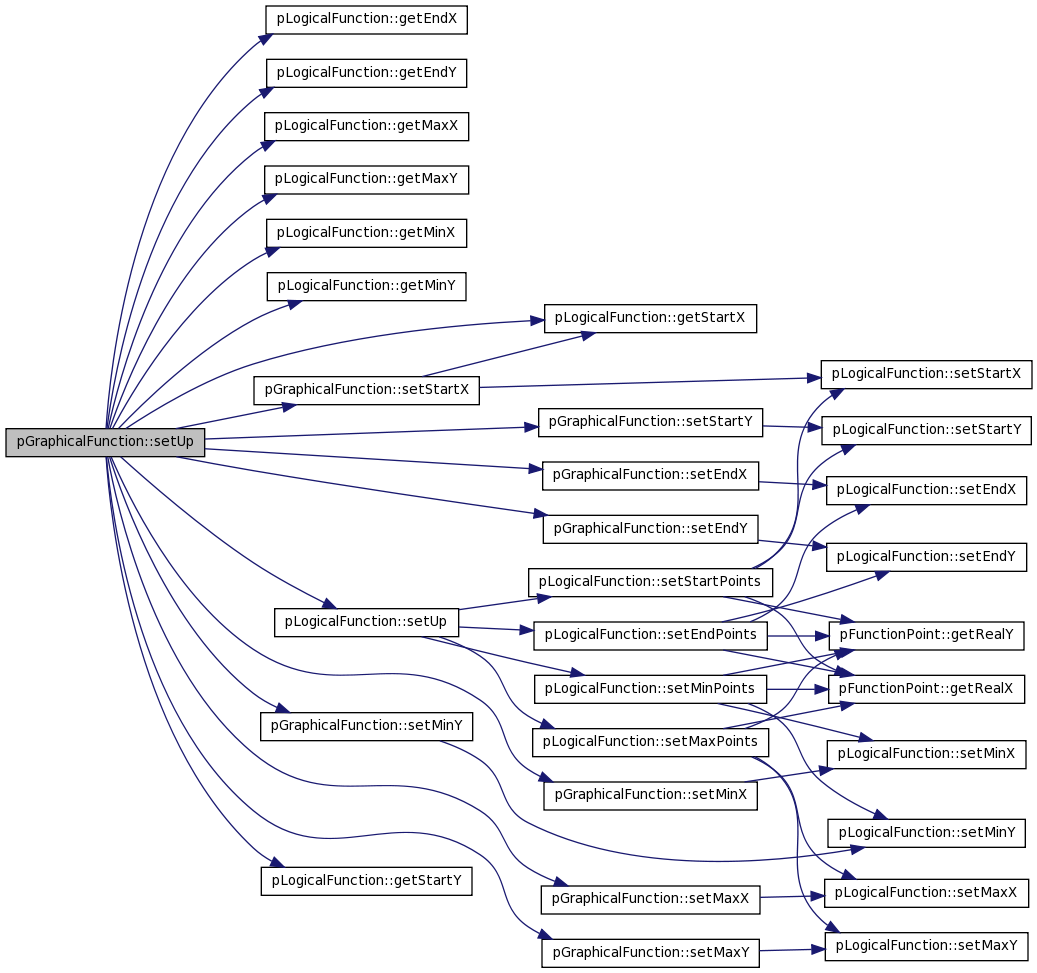

| void pGraphicalFunction::setValidPointRange | ( | int | theRange | ) |
Definition at line 805 of file pGraphicalFunction.cxx.
References logicFunction, pLogicalFunction::setValidPointRange(), and validPointRange.
00806 { 00807 logicFunction->setValidPointRange(theRange); 00808 validPointRange = theRange; 00809 }

| void pGraphicalFunction::setXTraslation | ( | int | xT | ) | [inline] |
Set the value of the traslation in the x-axis
- Parameters:
-
xT value in pixels of the traslation in x-axis
Definition at line 814 of file pGraphicalFunction.h.
References xTraslation.
00815 { 00816 xTraslation=xT; 00817 }
| void pGraphicalFunction::setZoomIn | ( | bool | z | ) | [inline] |
Definition at line 634 of file pGraphicalFunction.h.
References zoomIn.
00635 { 00636 zoomIn=z; 00637 }
| int pGraphicalFunction::validPointOnFunction | ( | wxPoint | realPoint | ) |
Definition at line 92 of file pGraphicalFunction.cxx.
References logicFunction.
Referenced by pPlotterWindow::onAddPoint(), pPlotterWindow::onDeletePoint(), and pPlotterWindow::onMouseMove().
00093 { 00094 return (logicFunction -> validPointOnFunction (realPoint)); 00095 }

| virtual int pGraphicalFunction::vGetType | ( | ) | [inline, virtual] |
Get the type of the curve 1=piecewise functio 2= smooth
Reimplemented from pPlotterLayer.
Definition at line 108 of file pGraphicalFunction.h.
References _type.
00109 { 00110 return _type; 00111 }
| void pGraphicalFunction::zooming | ( | int | clickedX, | |
| int | clickedY, | |||
| int | width | |||
| ) |
This method set the initial point and the final point of drawing according with the width of the square around the point clicked
- Parameters:
-
clickedX clickedY width,: width of the square
- Parameters:
-
clickedX clickedY width,: width of the square Note: all the parameters are pixels Pre: screenX, screenY, zoom are set! with the actual data. DEPRECATED!
Definition at line 439 of file pGraphicalFunction.cxx.
References _offsetX, _offsetY, _scaleX, _scaleY, finalDrawingPoint, pLogicalFunction::GetPointAt(), pFunctionPoint::getRealX(), pFunctionPoint::getRealY(), getSizePoints(), initialDrawingPoint, logicFunction, setScales(), and zoomIn.
00440 { 00441 int xS,yS,x1,x2,y1,y2; 00442 setScales(); 00443 xS=clickedX/_scaleX+_offsetX; 00444 yS=clickedY/_scaleY+_offsetY; 00445 //square 00446 x1=(clickedX-width)/_scaleX+_offsetX; 00447 x2=(clickedX+width)/_scaleX+_offsetX; 00448 y1=(clickedY-width)/_scaleY+_offsetY; 00449 y2=(clickedY+width)/_scaleY+_offsetY; 00450 00451 int numberPoints=getSizePoints(); 00452 pFunctionPoint* point; 00453 wxNode* p; 00454 bool inSquare=false,first=false; 00455 00456 //if the user made a zoom 00457 if(zoomIn) 00458 { 00459 int i; 00460 for(i=0; i<numberPoints;i++) 00461 { 00462 p=logicFunction->GetPointAt(i); 00463 point=(pFunctionPoint*)p->GetData(); 00464 int rx=point->getRealX(); 00465 int ry=point->getRealY(); 00466 inSquare= rx>=x1 && rx<=x2; //&& ry>=y1 && ry<=y2; 00467 if(inSquare) 00468 { 00469 if(!first) 00470 { 00471 initialDrawingPoint=point; 00472 _offsetX=rx; 00473 _offsetY=ry; 00474 first=true; 00475 } 00476 finalDrawingPoint=point; 00477 } 00478 } 00479 } 00480 else 00481 { 00482 //We extend the range of vision in x and y,20 and 10 respectively 00483 if((_offsetX-20)>=0) 00484 { 00485 _offsetX=_offsetX-20; 00486 } 00487 else 00488 _offsetX=0; 00489 if((_offsetY-10)>=0) 00490 { 00491 _offsetY=_offsetY-10; 00492 } 00493 else 00494 _offsetY=0; 00495 } 00496 }
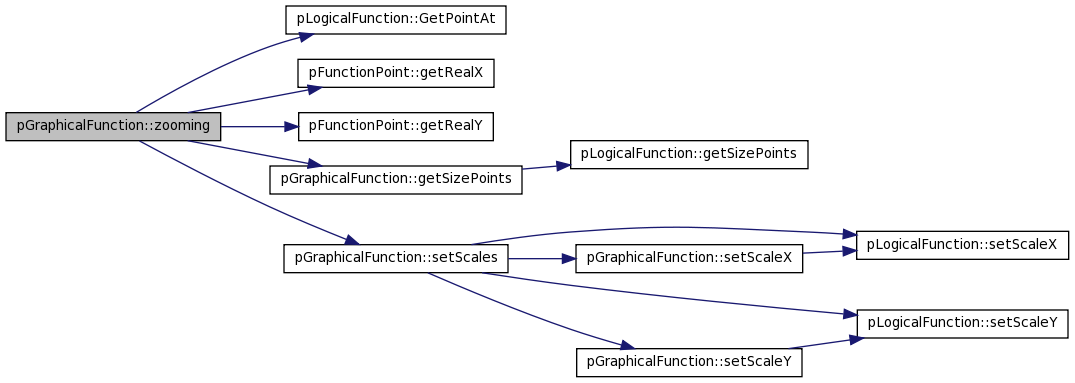
Member Data Documentation
double pGraphicalFunction::_endX [private] |
Is the last discrete point on x axis of the drawed function.
Definition at line 843 of file pGraphicalFunction.h.
Referenced by setEndX().
double pGraphicalFunction::_endY [private] |
Is the last discrete point on y axis of the drawed function.
Definition at line 847 of file pGraphicalFunction.h.
Referenced by setEndY().
double pGraphicalFunction::_maxX [private] |
Is the maximun x-real value reacheable by the function.
Definition at line 867 of file pGraphicalFunction.h.
Referenced by setMaxX().
double pGraphicalFunction::_maxY [private] |
Is the maximun y-real value reacheable by the function.
Definition at line 871 of file pGraphicalFunction.h.
Referenced by setMaxY().
double pGraphicalFunction::_minX [private] |
Is the minimun x-real value reacheable by the function.
Definition at line 859 of file pGraphicalFunction.h.
Referenced by setMinX().
double pGraphicalFunction::_minY [private] |
Is the minimun y-real value reacheable by the function.
Definition at line 863 of file pGraphicalFunction.h.
Referenced by setMinY().
double pGraphicalFunction::_offsetX [private] |
Is the logical x-offset of the drawed function.
Definition at line 875 of file pGraphicalFunction.h.
Referenced by getOffsets(), getOffsetX(), setMinShowed(), setOffsets(), setOffsetX(), and zooming().
double pGraphicalFunction::_offsetY [private] |
Is the logical y-offset of the drawed function.
Definition at line 879 of file pGraphicalFunction.h.
Referenced by getOffsets(), getOffsetY(), setMinShowed(), setOffsets(), setOffsetY(), and zooming().
double pGraphicalFunction::_scaleX [private] |
Is the x-scale percentage according to the context device.
Definition at line 851 of file pGraphicalFunction.h.
Referenced by getScales(), getScaleX(), setOffsets(), setScaleX(), and zooming().
double pGraphicalFunction::_scaleY [private] |
Is the y-scale percentage according to the context device.
Definition at line 855 of file pGraphicalFunction.h.
Referenced by getScales(), getScaleY(), setOffsets(), setScaleY(), and zooming().
double pGraphicalFunction::_startX [private] |
Is the initial discrete point on x axis of the drawed function.
Definition at line 835 of file pGraphicalFunction.h.
Referenced by setStartX().
double pGraphicalFunction::_startY [private] |
Is the initial discrete point on y axis of the drawed function.
Definition at line 839 of file pGraphicalFunction.h.
Referenced by setStartY().
int pGraphicalFunction::_type [private] |
Is the way of how points are going to be connected. It could be smooth, line.
Definition at line 883 of file pGraphicalFunction.h.
Referenced by getType(), setType(), and vGetType().
bool pGraphicalFunction::drawing [private] |
Indicates if the user is drawing the function
Definition at line 905 of file pGraphicalFunction.h.
Referenced by GetDrawing(), getDrawing(), and SetDrawing().
bool pGraphicalFunction::editable [private] |
The function is editable
Definition at line 947 of file pGraphicalFunction.h.
Referenced by getEditable(), and setEditable().
std::vector<pColorPoint *> pGraphicalFunction::f_colorPoints [private] |
Definition at line 891 of file pGraphicalFunction.h.
Referenced by getColorPoints(), and setColorPoints().
float pGraphicalFunction::factorZoom [private] |
factorZoom
Definition at line 943 of file pGraphicalFunction.h.
Referenced by getFactorZoom(), setFactorZoom(), and setScales().
final drawing point
Definition at line 959 of file pGraphicalFunction.h.
Referenced by getFinallDrawPoint(), setFinalDrawPoint(), and zooming().
bool pGraphicalFunction::fromWindow [private] |
if the function comes from window
Definition at line 939 of file pGraphicalFunction.h.
Referenced by AddNewPoint(), AddPoint(), changePoint(), DeletePoint(), deletePointAt(), getFromWindow(), getFromWindowV(), and setFromWindow().
bool pGraphicalFunction::ifActual [private] |
if is the actual
Definition at line 925 of file pGraphicalFunction.h.
Referenced by getActual(), getIfActual(), and setActual().
initial drawing point
Definition at line 955 of file pGraphicalFunction.h.
Referenced by getInitialDrawPoint(), setInitialDrawPoint(), and zooming().
Represents the logical function asociated to this graphical function.
Definition at line 826 of file pGraphicalFunction.h.
Referenced by AddNewPoint(), AddPoint(), addSplinesPoints(), changePoint(), DeletePoint(), deletePointAt(), getBefore(), getDirection(), getEndX(), getEndY(), getIndexOf(), getMaxX(), getMaxY(), getMinX(), getMinY(), GetPointAt(), GetPoints(), getSizePoints(), GetSplinePoint(), getStartX(), getStartY(), getX_RealValues(), getY_RealValues(), initializeSplineVectors(), load(), Rewind(), save(), setEndX(), setEndY(), setMaxX(), setMaxY(), setMinShowed(), setMinX(), setMinY(), setOffsetX(), setOffsetY(), setScales(), setScaleX(), setScaleY(), setStartX(), setStartY(), setType(), setUp(), setValidPointRange(), validPointOnFunction(), and zooming().
int pPlotterLayer::m_flags [protected, inherited] |
wxFont mpLayer::m_font [protected, inherited] |
Layer's font.
Definition at line 198 of file mathplot.h.
Referenced by pPlotterScaleY::Plot(), pPlotterScaleX::Plot(), mpScaleY::Plot(), mpScaleX::Plot(), mpFXY::Plot(), mpFY::Plot(), and mpFX::Plot().
wxString mpLayer::m_name [protected, inherited] |
Layer's name.
Definition at line 200 of file mathplot.h.
Referenced by mpScaleY::Plot(), mpScaleX::Plot(), mpFXY::Plot(), mpFY::Plot(), and mpFX::Plot().
wxPen mpLayer::m_pen [protected, inherited] |
Layer's pen.
Definition at line 199 of file mathplot.h.
Referenced by pPlotterScaleY::Plot(), pPlotterScaleX::Plot(), pPlotterLayer::Plot(), mpScaleY::Plot(), mpScaleX::Plot(), mpFXY::Plot(), mpFY::Plot(), and mpFX::Plot().
int pGraphicalFunction::maxShowedX [private] |
Maximum point showed to the user (zoom)X
Definition at line 969 of file pGraphicalFunction.h.
Referenced by getMaxXShowed(), setMaxShowedX(), and setScales().
int pGraphicalFunction::maxShowedY [private] |
Maximum point showed to the user (zoom)X
Definition at line 979 of file pGraphicalFunction.h.
Referenced by getMaxYShowed(), setMaxShowedY(), and setScales().
int pGraphicalFunction::minShowedX [private] |
Minimum point showed to the user (zoom)X
Definition at line 964 of file pGraphicalFunction.h.
Referenced by getMinXShowed(), setMinShowedX(), setOffsets(), and setScales().
int pGraphicalFunction::minShowedY [private] |
Minimum point showed to the user (zoom)Y
Definition at line 974 of file pGraphicalFunction.h.
Referenced by getMinYShowed(), setMinShowedY(), setOffsets(), and setScales().
wxPoint pGraphicalFunction::mousePoint [private] |
this is for the graphical function Mouse Point
Definition at line 911 of file pGraphicalFunction.h.
Referenced by getMousePoint(), and SetMousePoint().
int pGraphicalFunction::mType [private] |
wxNode* pGraphicalFunction::node [private] |
node of the realPoints where are we
Definition at line 896 of file pGraphicalFunction.h.
Referenced by addSplinesPoints(), getBefore(), GetNextXY(), Rewind(), and setMinShowed().
int pGraphicalFunction::offsetPixelX [private] |
offset in pixels where the user has clicked before changing the scale
Definition at line 1001 of file pGraphicalFunction.h.
Referenced by getOffsetPixelsX(), getOffsetPixelsXv(), setOffsetPixelX(), and setOffsets().
int pGraphicalFunction::offsetPixelY [private] |
Definition at line 1002 of file pGraphicalFunction.h.
Referenced by getOffsetPixelsY(), getOffsetPixelsYv(), setOffsetPixelY(), and setOffsets().
int pPlotterLayer::offsetX [protected, inherited] |
offset X
Definition at line 244 of file pPlotterLayer.h.
Referenced by pPlotterLayer::drawFunction(), pPlotterLayer::drawLineToMousePoint(), pPlotterLayer::drawPoints(), pPlotterLayer::drawSplineCurve(), pPlotterScaleX::Plot(), and pPlotterLayer::Plot().
int pPlotterLayer::offsetY [protected, inherited] |
offset Y
Definition at line 249 of file pPlotterLayer.h.
Referenced by pPlotterLayer::drawFunction(), pPlotterLayer::drawLineToMousePoint(), pPlotterLayer::drawPoints(), pPlotterLayer::drawSplineCurve(), getOffsets(), pPlotterScaleY::Plot(), and pPlotterLayer::Plot().
wxList pPlotterLayer::points [protected, inherited] |
Definition at line 231 of file pPlotterLayer.h.
Referenced by pPlotterLayer::drawFunction(), pPlotterLayer::drawLineToMousePoint(), and pPlotterLayer::drawPoints().
wxList pGraphicalFunction::realPoints [private] |
The list of the function points
Definition at line 887 of file pGraphicalFunction.h.
int pGraphicalFunction::scaleWay [private] |
the way we scale DEFECT_SCALE 1 MAX_SCALE 2 USER_SCALE 3
Definition at line 934 of file pGraphicalFunction.h.
Referenced by getScaleWay(), and setScaleWay().
double pPlotterLayer::scaleX [protected, inherited] |
Definition at line 235 of file pPlotterLayer.h.
Referenced by pPlotterLayer::drawFunction(), pPlotterLayer::drawLineToMousePoint(), pPlotterLayer::drawPoints(), pPlotterLayer::drawSplineCurve(), pPlotterScaleX::Plot(), pPlotterLayer::Plot(), and setScales().
double pPlotterLayer::scaleY [protected, inherited] |
Definition at line 239 of file pPlotterLayer.h.
Referenced by pPlotterLayer::drawFunction(), pPlotterLayer::drawLineToMousePoint(), pPlotterLayer::drawPoints(), pPlotterLayer::drawSplineCurve(), pPlotterScaleY::Plot(), pPlotterLayer::Plot(), and setScales().
int pGraphicalFunction::screenX [private] |
The size of the screen in X
Definition at line 916 of file pGraphicalFunction.h.
Referenced by getScreens(), getScreenX(), setScales(), setScreens(), and setScreenX().
int pGraphicalFunction::screenY [private] |
The size of the screen in Y
Definition at line 921 of file pGraphicalFunction.h.
Referenced by getScreens(), getScreenY(), setScales(), setScreens(), and setScreenY().
bool pGraphicalFunction::showPointsF [private] |
If the function has to showpoints
Definition at line 830 of file pGraphicalFunction.h.
Referenced by getShowPoints(), ifShowPoints(), and SetShowPoints().
int pGraphicalFunction::validPointRange [private] |
Number that determines the radius range for the valid area the point (sensible radius). Default value 5.
Definition at line 900 of file pGraphicalFunction.h.
Referenced by getValidPointRange(), and setValidPointRange().
vtkKochanekSpline* pGraphicalFunction::xKSpline [private] |
Definition at line 992 of file pGraphicalFunction.h.
Referenced by addSplinesPoints(), GetSplinePoint(), and initializeSplines().
std::vector<double> pGraphicalFunction::xSpline [private] |
Definition at line 985 of file pGraphicalFunction.h.
Referenced by clearSplineVectors(), getXSpline(), and initializeSplineVectors().
int pGraphicalFunction::xTraslation [private] |
Definition at line 1014 of file pGraphicalFunction.h.
Referenced by getXTraslation(), and setXTraslation().
vtkKochanekSpline* pGraphicalFunction::yKSpline [private] |
Definition at line 994 of file pGraphicalFunction.h.
Referenced by addSplinesPoints(), GetSplinePoint(), and initializeSplines().
std::vector<double> pGraphicalFunction::ySpline [private] |
Definition at line 987 of file pGraphicalFunction.h.
Referenced by clearSplineVectors(), getYSpline(), and initializeSplineVectors().
bool pGraphicalFunction::zoomIn [private] |
if the user did a zoom in/out
Definition at line 951 of file pGraphicalFunction.h.
Referenced by getZoomB(), setZoomIn(), and zooming().
The documentation for this class was generated from the following files:
- /Users/davila/Creatis/creaMaracasVisu/lib/maracasVisuLib/src/interface/wxWindows/widgets/pPlotter/pGraphicalFunction.h
- /Users/davila/Creatis/creaMaracasVisu/lib/maracasVisuLib/src/interface/wxWindows/widgets/pPlotter/pGraphicalFunction.cxx
 1.5.7.1
1.5.7.1